#i don’t know if it was intentional to show the parallels i’ve described here
Text
I feel like people don’t really bring up how Jackson and Holt have unintentionally shown aspects of DID that normally isn’t portrayed in media all that much. I mean a lot of people do think they work as a DID allegory but I feel like not a lot of people really explain why outside of “well they are two personalities who share a body,” so I personally want to go in and bring up some more specific examples.
One specific thing not a lot of people bring up ( at least in mainstream media) is how switching to an alter and having that alter front can cause memory gaps with the host. Jackson has expressed multiple times that when he comes back to front, he often ends up in places and scenarios that he swears he wasn’t in before. He has no idea what Holt does and Vice versa.
Another aspect is how disorienting switching can be. From what I’ve heard, when you switch and an alter fronts it sometimes takes a minute to come back down and ground yourself. Same thing when the host comes back to front. Both Holt and Jackson visibly twitch and shake and while that may not be how switching looks, it does work as a visual cue to the audience that going from one personality to the other is not an easy process for either of them.
Also with Holt specifically, it actually is very possible for an alter not even realize they’re an alter. Like Steven from Moonknight for example. A big plot twist in the show is learning that Steven himself isn’t the host, he is an alter and for the longest time he had no idea. This parallels Holt who also had no idea that he and Jackson are one in the same. While I don’t know how common that is, I do know there have been times where an alter just doesn’t realize they’re an alter.
But going back to talking about both of them, I also like how Jackson has a specific trigger when it comes to when Holt will front. See a big part of DID is that an alter often is meant to protect the host from a specific, traumatic event hence why a lot of them have titles like “protector”. Either that or they are personified as the traumatic event in some way. It’s super complicated and not every person with DID is the exact same but generally speaking DID is a result of someone unable to handle a traumatic event so someone else takes hold of those memories instead. That’s probably not the best way of describing it so please feel free to correct me.
Anyway! Point here is that while Jackson doesn’t show any signs of having trauma there are times, generally speaking, where a specific event or thing will trigger an alter to front. And with Jackson, that trigger is music. (Specifically a song in the 4 by 4 count and reaches a certain decible or whatever I don’t care ahdhshs).
So with all that being said, I hope this helps break down why Jackson and Holt work as a DID allegory. While I don’t think that was the intention with the character, it just ends up working nicely anyway.
#long post#haven rambles#monster high#character analysis#jackson jekyll#holt hyde#DID#dissociative identity disorder#mental health talk
144 notes
·
View notes
Text
El’s soap opera spelling out Midleven’s end
I made an analysis of a scene with El back in 2019, under a different username (@proud-losers: Original post here - https://proud-losers.tumblr.com/post/188477016057/mileven-and-byler-outcome-depictions-in-episode-of), and, after being gone and off social media for a few years, I wanted to come back and have this blog for Byler and Byler only. Now that season 4′s come and renewed just how strongly I feel for Byler and believe in them, I wanted to refresh this old post and add to it. Season 4 really accentuated and solidified it as the piece of evidence it is.
Here it is as follows, old info combined with new:
In season 2′s “Trick or Treat, Freak,” when El is watching television, one of the channels shows an episode of All My Children (an episode that would’ve been aired in the Fall of 1984). I [even more than I did when I first posted this] think it’s meant to show where Midleven is inevitably headed + shows yet another clear example of Mike’s withheld sexuality/eventual getting together with Will:

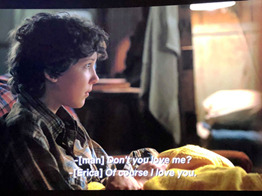
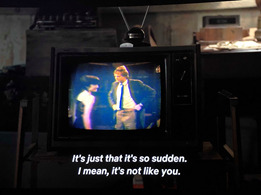
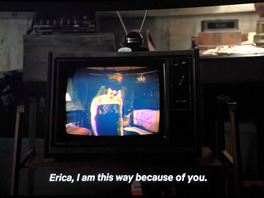


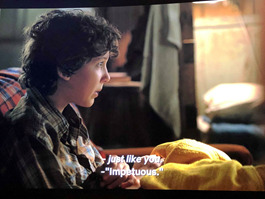

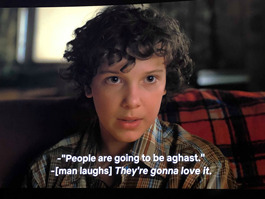



The Duffers confirmed a long while back that El watching Frankenstein (in this same episode) was to represent how she feels like a monster, so why wouldn’t this episode of All My Children contain a deeper significance? This one clip both describes and foreshadows what happened in season 3 between Mike and El and what will happen later between Mike and Will (season 5, guys!).
I did some research on the background of this particular All My Children episode’s context and realized the episode El is watching comes after Erica Kane, the woman in-scene, loses her husband in a tragic accident (in which he did not actually die, but this is irrelevant to the main points I’ve drawn), and rather quickly gets involved with a man whose name happens to be Mike (same man in-scene). Erica and Mike get together quickly after Erica’s husband’s “death,” and Mike wants her to marry him very shortly after they meet—too quickly after and even during a tragic circumstance. It’s reminiscent of the way El gets together with Mike: quickly and born out of tragic circumstances. The word “impetuous,” is specifically highlighted in the scene. It means to be impulsive, rash, hasty: all perfect descriptors of how fast El and Mike supposedly ‘fell in love.’
It’s important to note that, with Mike’s proposal, the scene cuts off before Erica agrees. The audience isn’t allowed to hear it, which seems intentional. Perhaps because El will/is moving away from her relationship with Mike. Midleven won’t be together in the end, just as Erica and her Mike ultimately aren’t together in the end either. ADDITIONALLY, now that we’re past season 4, this is also perfectly set up with Mike’s monologue. We HEAR Mike prattle his ‘love,’ a proposal he tosses El’s way. And yet… We DON’T get El’s response. It’s what she wanted so dearly before, to hear and have those words from Mike, but now she seems to be metaphorically walking away from Mike’s pitched ‘proposal.’ It’s kind of like—and I hope I’m making sense in this—how she walks away from the television in “Trick or Treat, Freak,” preventing us from hearing an answer from Erica.
When it comes to paralleling the two Mikes, it’s incredibly interesting that Erica not only says her Mike’s proposal is sudden but is also ‘not like him.’ Fans of All My Children say Mike professes his ‘undying love’ for Erica very shortly after their meeting; again, it’s too quick of a confession, and how can he already be so sure his love is so undying and true? Mike says he is this way—“wild and impetuous”—because Erica ‘made him that way.’ We know Mike loves El, genuinely, but not romantically. We can see this even more clearly with the emphasized pieces of Mike’s character in season 4. It’s ‘not like him’ to be in this sort of [heterosexual] relationship in which he is only in it—impetuously so—because of El (highlighted gesture El makes to herself while saying “Me?”). Simply put, he is ‘this way’ because of the idea of her (NOTE: Whether you subscribe to gay or bi Mike, both of which I lovingly welcome, the argument still stands whether it’s not like him to be with El because it’s a heterosexual relationship or because El is just not the one he truly loves. Either way, it’s far more indicative that Mike is actually in love with Will, who we see Mike be more ‘like himself’ with).
Segway to another highlighted line: “People are going to be aghast.” This line gave me two interpretations. First: Mike and El being together in season 3 do cause a number of “aghast” reactions: Dustin calling it out as “bullshit,” Hopper not finding their relationship normal, Max not approving of the way El is treated, Will calling it “gross” (we know he’s jealous, but, still, point’s been made) etc. People should be ‘loving it,’ the perceived normalcy of it from Mike’s perspective perhaps, but this relationship is ill-fitting (and we continue to see how even more ill-fitting it is in season 4). We saw Mike’s discomfited and obviously confused reaction to the kiss El initiates in the finale of season 3. For Mike, aside from thinking ‘What the hell just happened?’ in-script, he likely thought afterward that he should have loved it, that it should be like him to love it, and yet there he was, sporting parallels to when he thought he lost Will in season 1. Second: There’s also the thought of the aghast reactions toward Byler when it happens, because it will ‘stun the whole town [Hawkins]/the whole world [viewers].’ What of the “they’re gonna love it” line then? The people who matter are going to love them.
#that's us#we're gonna love them#cheesy but true#byler#byler endgame#byler analysis#byler theory#will byers#mike wheeler
169 notes
·
View notes
Note
hi mt.
i’ve been reading your posts recently and you’ve been pretty critical towards zabel. as someone who’s watching the show i can’t disagree, there is much i don’t like, but you seem absolutely sure he isn’t acquainted with the original show (and even more so with caryl’s story), but whilst that’s true in terms of daryl’s character, i can’t really say about caryl.
what i mean is, he seems to have done his homework, or at least a part of it: the daryl we see in the spin-off reminds me of the way he was in the first seasons, when he didn’t really trust the group or anyone around him. sure it feels real far from the character he’s grown into during the last seasons, but maybe they thought it’d make sense for him to act the same way in this somehow similar context?
and this brings me to the next point, caryl. if you watch carefully, the hints are all there: episode 1, the flashback, episode 2 daryl blows up some tanks of gas in a way that any diehard twd fan will immediately associate with carol’s terminus scene. and we know there’s another more important flashback of carol and sophia coming up, and for that they even had to do specific casting and everything. Daryl now even carries a knife identical to carol’s signature weapon.
so maybe zabel did do his research? and if not, who do you think is responsible for these tiny details inserted here and there? is it all some sort of shipbaiting to keep caryl fans interested despite all the shit they’ve had thrown their way?
We can assume Zabel read scripts from the first few seasons because on the page, Daryl's scars are first described as cigarette burns and when asked about them in the spinoff, Daryl says his "daddy was a smoker." But that makes me wonder if Zabel only realized when the time came to look at reference photos that the burns never actually made it on screen in the main show, and that's why they're suddenly plain as day in the pilot. Why doesn’t Daryl have the bullet scar on his chest? We see it in 10x07, so did Zabel not watch that far? Does he not know Daryl got shot in S6/S7? Does he not realize Norman’s newer tattoos were visible in S11 and didn’t need covering up? (Side note: if you are going to make the choice to cover them up, make sure they’re consistently covered up 🤦♀️)



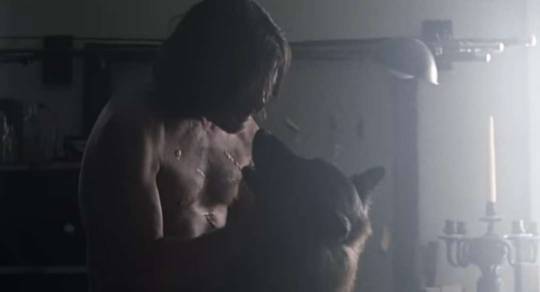


If the intention was for Daryl to revert back to the "fish out of water" he was in the early seasons, then yes, Zabel would probably have to watch at least parts of those seasons to get a sense of his voice. Fwiw, I think that’s an odd decision because that's not the version of Daryl most fans were drawn to. It was the nuances he started to show during and after the Cherokee rose scene with Carol. I suspect Zabel was following the mandate to “reset” the character, but at the same time, he still should’ve been 💯familiar with the source material. That’s doing the bare minimum, so I don’t excuse him for cutting corners if that’s what he did, and there seem to be too many inconsistencies to prove otherwise.
I also don't doubt he and/or the other writers watched pivotal Caryl scenes because, yes, the parallels are there like you said. Whether they were always intended to set up Caryl’s arc or initially just evoke the same emotions for another character/relationship, well 😒 Keep in mind that contrary to what will inevitably be spun, it was not known from the start that Melissa would come back. Yeah, there's the flashback in the pilot, and Daryl looking at the photo of the Irish man with his wife and daughter, and the Irish man's V.O., but those may not have ever been in the script, they could've just been decided on in post. I can’t be sure, but the point I’m driving at is, if Zabel didn't know he had to set up Carol's return for a good long while, honoring her character and Caryl’s relationship wouldn’t have been his first priority. His fist priority would’ve been the characters he could actually write for. I’m not suggesting he maliciously gave away Caryl’s arc. AMC on the other hand tends to assume women are interchangeable and if one character mirrors our favorite, we'll grow to like that character for the same reasons. Remember Maggie’s jacket that we all said looked like Carol’s? 🤷🏻♀️
Obviously we know that Carol is coming back now and at some point Zabel would’ve had to start writing to that which he could’ve done by retroactively adding small bread crumbs in the first half like the flashback, maybe some lines of dialogue, or anything else that wouldn’t have required massive rewrites (or more rewrites than there already were). So if something feels shoehorned in or contradictory (I know people were talking about the scene where Daryl tells Laurent he has “nothing like” a wife and kids), that could definitely be why. Not saying all of this to rain on anyone’s parade. If the small moments bring you comfort, please do take them. After all the “parallels” throughout the Leah arc went absolutely nowhere though, I would personally much rather wait until we get the real deal i.e. an explicit Caryl arc before I bother to watch.
I’ve definitely written too much for someone who’s not watching and I’m trying to wait a few more weeks before I elaborate on anything, but since you asked, I hope this gives you a better sense of where my head is at right now.
16 notes
·
View notes
Text
John as Card 1: The Magician
The Magician (also known as The Wizard, which G1deon literally calls John pre-res) is generally understood as a reflection of the Hermetic concept: as above, so below. This phrase can take on a lot of interpretations depending on the theological contexts, but because we’re talking about a man who just reinvented Gay Space Catholicism, I’ll only be addressing debatably the most famous renditions of this phrase, “Thy kingdom come, Thy will be done, on Earth as it is in Heaven''. This phrase from the Lord’s Prayer is used by Christians as a means to invoke God's will on Earth, which seems fitting for a Catholic space emperor with the desire to create a universe he can bend to his will.
The Magician also signifies the creative process and the act of taking a concept or idea and molding it into something tangible. Again, pretty obviously a God thing.
Now here’s where things start to get more interesting (and potentially plot relevant? tbd). The Magician shows a potential for arrogance, feelings of superiority, a tendency to abandon projects after they’re started, and loss of focus on an idea’s original intent when sustained for too long (like, potentially, a myriad). I think the fucker is going to blow up the universe and start fresh. Great Flood 2.0. I’ve suspected this since reading all of the John chapters in NtN, which, imo, read like an epilogue to the series as a whole, or at least a sympathetic villain monologue before the villain does something monumentally evil, and his connection to The Magician would further solidify this.
Another juicy tidbit is that The Magician in reverse represents deceit. It can symbolize someone who is charming and charismatic, yet states things that don’t add up. This card showing up in a reading can mean that someone in your life who presents themselves as knowledgeable and trustworthy is covertly manipulating you. It would take another full series reread for me to be able to list all the things John lies about, but the most notable is his deception of the resurrection gang.
He paints himself as a “just some guy” god (and to his credit, he is Just Some Guy) but he absolutely uses that boy-next-door exterior to lie to and extort all his closest friends. He lies to them about their names. He hides the truth about lyctorhood from them. He leaves them to figure out lyctorhood by themselves and allows them to sacrifice the people closest to them so that they can be his immortal hand. I’m sure Mercymorn, Augustine, and G1deon figuring this out and plotting to betray him is just the beginning of the retribution he’ll suffer for this.
Alecto/Nona as Card 0: The Fool
(Full disclosure, I’m not exactly the resident Alecto expert so there’s probably a lot of things I’m forgetting or missing but just bare with me here.)
The fool represents new beginnings, having blind faith in the future, being inexperienced, and having a fundamental belief in the universe. In reverse, it represents being foolish, reckless, naive, gullible, air-headed, and several other traits that more or less describe Nona. The figure on the card has his arms flung wide, and his head held high (is this not exactly the Nona cover art?). He is ready to embrace whatever comes his way, but he is also oblivious to the cliff edge he is about to cross. The Fool is unaware of the hardships he will face as he ventures out to learn the lessons of the world. The parallels to Nona’s journey are obvious, but I’d imagine Alecto went through a similar journey from her creation to her imprisonment.
Ultimately we don’t know much about her in the earliest days, but it only makes sense that she had Nona’s personality prior to going crazy. She was also the first to have blind faith in John and the universe he crafted, and for that, she suffered immensely.
#tlt meta#john gaius#alecto the first#the locked tomb#tlt theories#the paragraphs in this post might have formatted like shit I’m so so sorry#my ongoing theory is that the houses are connected to the first 9 cards in the major arcana#and that the remaining 12 are going to show up in substantial themes
17 notes
·
View notes
Text
first original post on here in a while because i’ve been watching encanto on a loop since it came out and i have THOTS.
my major one is how dolores’ verse in we don’t talk about bruno is so centered around bruno’s pain and struggle within the family- how no one ever understood him or his gift. she doesn’t demonize him, unlike some people (cough cough resident theater kid) and needs mirabel to understand that bruno is not and was never a bad guy. her desperation in the line “do you understand?” gets me every time
and why would she? even aside from knowing that he’s listening, dolores understands better than ANYONE how it feels to have knowledge you didn’t want and that people resent you for. dolores just has no way to turn it off.
there’s also the fact that we never see her really helping the town throughout the movie. abuela seems to have pretty limited ideas for what her family’s gifts can do for people, and i doubt she would have many ideas for how dolores gift would benefit the community, same with how she shows some trepidation with figuring out what to do with antonio’s gift, mostly just focusing on her relief that the encanto is working properly again.
it makes sense to me that after a while, abuela probably left dolores to her own devices. not trying to completely demonize abuela here, i have complicated thoughts on her character but i do NOT think she’s a monster, i just think that she would try to focus on more concrete and simple ways to help the community in day to day life, where dolores’ gift is pretty specialized. maybe every now and then she relays messages from the townspeople when there’s an emergency or someone doesn’t feel like coming all the way to the casita, but i doubt abuela would come up with anything else.
all this to say- i think dolores understands what bruno went through with his gift, being deemed either useless or actively malicious. dolores was probably terrified of people targeting her for knowing too much, the same as bruno being targeted for not always having happy visions. she knows what happens to people when their gift isn’t helpful enough, so she melted into the shadows.
i think bruno probably appreciated having someone in his corner even before mirabel came to him, someone who gets it like no one else in the madrigals can. though i bet it probably killed him that his niece had to go through what he did, especially after giving her the vision of mariano. i definitely agree with the hcs that dolores snuck him notes or food any chance she got, she probably misses the shit out of bruno and wishes he could sit with everyone at dinner for real.
anyways. bruno and dolores solidarity.
#encanto#bruno madrigal#dolores madrigal#mm says stuff#the fact that bruno and dolores are the only ones who have their eyes open on their doors is#interesting to me#i don’t know if it was intentional to show the parallels i’ve described here#or if it was just a ‘oh their gifts both use the senses (hearing v sight) so it makes sense’#either way. i have chronic reading too deeply into things disorder#once i get my tablet pen back i’m gonna draw dolores and bruno hangouts#ALSO I DONT THINK CAMILO IS AN ASSHOLE FOR HIS VERSE IN WDTAB EITHER#i think he’s a theater kid who wanted to fuck around and spook his cousin#he’s an asshole but in a teenager way
332 notes
·
View notes
Text
Ted Lasso 2x11 thoughts
For an episode that ends with a journalist Ted trusts but has (understandably) recently lied to warning Ted that he’s publishing an article about his panic attacks, it was fitting that this episode seemed entirely about what all of these characters choose to tell each other. And after most of a season of television that Jason Sudeikis has described as the season in which the characters go into their little caves to deal with things on their own, it turns out they are finally able to tell each other quite a lot.
Which is good because, um, wow, a lot is going to happen in the season finale of this show!
Thoughts on the things people tell each other behind the cut!
Roy and Keeley. I absolutely loved the moment during their photoshoot in which they bring up a lot of complicated emotional things and are clearly gutted (“gutted”? Who am I? A GBBO contestant who forgot to turn the oven on?) by what they’ve heard. We already know that Keeley and Roy are great at the kinds of moments they have before the shoot begins, in which Roy builds Keeley up and tells her she’s fucking amazing. From nearly the beginning of their relationship, they’ve supported each other and been each other’s biggest fans. But their relationship has gone on long enough that they’ve progressed from tentative arguments about space and individual needs into really needing to figure out what they mean to each other and how big their feelings are and what that means in relation to everything else. Watching these two confess about the uncomfortable kiss with Nate, the unexpectedly long conversation with Phoebe’s teacher, and—most painfully—the revelation that Jamie still loves Keeley didn’t feel like watching two people who are about to break up. (Although I could see them potentially needing space from each other to get clarity.) It felt like watching two people realize just how much they’d lose if they lost each other, which is an understandably scary feeling even—or especially—when you’re deeply in love but not entirely sure what the future holds. Not entirely sure what you’re capable of when you’ve never felt serious about someone in quite this way, and are realizing you have to take intentional actions to choose that relationship every single day. I’m excited to learn whether Roy and Keeley decide they need to solidify their relationship more (not necessarily an engagement, but maybe moving in together or making sure they’re both comfortable referring to the other as partner and telling people they’re in a committed relationship) or if things go in a different direction for a while.
Sharon and Ted. I’ve had this feeling of “Wow, Ted is going to feel so intense about how honest he’s been with Sharon and is going to end up getting really attached and transfer a lot of emotions onto the connection they have and that is stressful no matter how beneficial it has been for him to finally get therapy!” for a while now. And Sharon’s departure really brought that out and it was indeed stressful. But the amount of growth that’s happened for both of these characters is really stunningly and beautifully conveyed in this episode. Ted is genuinely angry she left without saying goodbye, and he doesn’t bury it some place deep inside him where it will fester for the next thirty years. He expresses his anger. (I also noticed he sweared—mildly—in front of her again, which is really a big tell for how much he has let his carefully-constructed persona relax around her.) He reads her letter even though he said he wasn’t going to, and he’s moved. I don’t think Ted has the words for his connection to Sharon beyond “we had a breakthrough,” but Sharon gets it, and is able to firmly assert a professional boundary by articulating her side of that breakthrough as an experience that has made her a better therapist. And is still able to offer Ted a different kind of closure by suggesting they go out before her train leaves. No matter how you feel about a patient/football manager seeing their therapist/team psychologist colleague socially, I appreciated this story because IMO it didn’t cross big lines but instead was about one final moment in this arc in which both Ted and Sharon saw each other clearly and modeled what it is to give someone what they need and to expect honesty and communication from them. I liked that Ted ends up being the one saying goodbye. (The mustache in the exclamation points!) I like that whether or not Sharon returns in any capacity (Sarah Niles is so wonderful that I hope she does, but I’m not sure), the goodbye these characters forge for themselves here is neither abandonment nor a new, more complicated invitation. It’s the end of a meaningful era, and although the work of healing is the work of a lifetime, it’s very beautiful to have this milestone.
Ted and Rebecca. So, maybe it’s just me, but it kinda feels like these two have a few li’l life things to catch up on?! (HAHHHHHaSdafgsdasdf!) I really adored their interactions in this episode. I maintain that Biscuits With The Boss has been happening this whole time (even when Ted’s apartment was in shambles, there’s biscuit evidence, and I feel like we’ve been seeing the biscuit boxes in Rebecca’s office pretty regularly too), even if it might have been more of a drive-by biscuit drop-off/feelings avoidance ritual. It was really lovely to see Ted on more even footing in Rebecca’s office, joking around until she tells him to shut up, just like the old days. And GOSH—for their 1x9 interaction in Ted’s office to be paralleled in this episode and for Ted to explicitly make note of the parallel in a way Rebecca hears and sees and understands?! MY HEART. In both of Rebecca’s confessions, she is not bringing good news but it is good and meaningful that she chooses to share with Ted. In both situations, Ted takes the moment in stride and offers acceptance equivalent to the gravity of what she has to confess. And in both situations, he’s not some kind of otherworldly saint, able to accept Rebecca no matter what because he’s unaffected by what she shares. He is affected. When he tells her about Sam, you can see a variety of emotions on his face. Rebecca is upset and Ted is calm, and even if I might have liked for him to try to talk about the risk the affair poses to the power dynamics on the team or any number of factors, I also really liked that he just accepts where she is, and—most importantly—does not offer her advice beyond examining herself and taking her own advice. A massive part of being in a relationship with another person (a close relationship of any nature) is figuring out how to support that person without necessarily having to be happy about every single thing they do. It’s so important that Ted connects what she’s just told him about Sam back to what she told him last season about her plot with the club. These both feel like truth bombs to him, and he is at least safe enough to make that clear. These are both things that impact him, things that shape how he sees her and maybe even how he sees himself. He cares about her and is capable of taking in this information; he has room for it. But it’s not something he takes lightly, and neither does she. See you next year.
Tumblr user chainofclovers and the TV show Ted Lasso. My brain is going wild thinking about all the ways the next “truth bomb” conversation could go in 3x11 or whatever. Maybe they go full consistent parallel and Rebecca confesses something else, this time about her and Ted or some other big future thing that impacts him as much or more as the other confessions have. (The same but different.) Maybe the tables turn and Ted has something to confess to her. While the 1x9 conversation ended in an embrace and the 2x11 conversation ended with a bit more physical distance (understandable given the current state of their relationship and the nature of the discussion), the verbal ending of both conversations involved voices moving into a sexier lower register while zooming in to talk specifically about their connection to each other, so I have to assume there will be some consistencies in s3 even if the circumstances will be completely different. I don’t really know where I’m going with this and I obviously will go insane if I sustain this level of anticipatory energy until Fall 2022 but I have a feeling my brain and heart are going to try!
Sam and Rebecca. I know there’s been a lot of criticism about whether this show is being at all realistic about the power dynamics and inevitable professional issues this relationship would create. On some level, I agree; I like that pretty much everyone who knows about the affair has been kind so far, but you can be kind and still ask someone to contend with reality. But I also think that in nearly every plot point on this show, the narrative is driven by how people feel about their circumstances first and foremost. (It’s why the whiteboard in the coaching office and the football commentators tell us more about how the actual football season is going from a points perspective than anyone else.) This episode reminded me how few people know about Sam and Rebecca, and how much their time together so far has been time spent in bed. The private sphere. I thought this episode really expertly brought the public sphere into it, not—thank goodness—through a humiliating exposure or harsh judgment but through an opportunity for Sam that illustrates not only all his potential to do great things but how much Rebecca’s professional position and personal feelings are in conflict with that. Could stand in the way of that. I don’t have a strong gut feeling about where this will go, but I do think Sam’s face in his final scene of this episode is telling. He started the episode wanting to see Rebecca (his most recent text to her was about wanting to connect), and Edwin’s arrival from Ghana really exploded his sense of what is possible for his life. If he’d arrived home to Rebecca sitting on his stoop prior to meeting Edwin, he’d have been delighted. Now he’s conflicted, and whatever decision he makes, he has to reckon with the reality that he cannot have everything he wants. No matter what. And Rebecca—she has taken Ted’s advice and is attempting to be honest about the fact that she can’t control Sam’s decisions but hopes he doesn’t go, and even saying that much feels so inappropriate. And I’m not sure how much she realizes about the inappropriateness of the position she’s putting him in, although maybe she’s getting there considering she exits the scene very quickly. I’ve honestly loved Rebecca’s arc this season. I think it’s realistic that she got obsessed with the intimacy she thought she could find in her phone. I think it’s realistic that her professional and personal ambitions are inappropriately linked. (They certainly were for Rupert. It’s been years since she’s known anything different; even if she’s done some significant recovery work to move on from her abusive marriage and figure out her own priorities, she’s got a long way to go.) I know there are people who will read this interaction between Rebecca and Sam as a totally un-self-aware thing on the part of “the show” or “the writers” but what I saw is two people who enjoyed being in bed together and now have to deal with the reality that they’re in two different places in their lives and that one has great professional power over the other. If that wasn’t in the show, I wouldn’t be able to see it or feel so strongly about it.
Edwin and Sam. I really enjoyed all the complexities of this interaction. Edwin is promising a future for Sam that doesn’t quite exist yet, though he has the financial means to make it happen. He offers this by constructing for Sam a Nigerian—and Ghanaian—experience unlike anything he’s found in London. Sam is amazed that this experience is here, and Edwin’s response is to explain to him that the experience is not here. Not really. The experience in Africa. Sam has of course connected to the other Nigerian players on the team, but this is something else entirely. I’m really curious if Sam is going to end up feeling that what Edwin has to offer is real or not. That sense of home and connection? So real. And so right that he would want to experience that homecoming and would want to be part of building that experience for others. But at the end of the day, he went to a museum full of actors and a pop-up restaurant full of “friends,” and is that constructed authenticity as a stand-in for a real homecoming more or less real than the home he’s building in Richmond? (With other players who stand in solidarity with him, and with well-meaning white coaches who say dumb stuff sometimes, and an a probably-doomed love interest, and a feeling that he should put chicken instead of goat in the jollof, and the ability to stand out as an incredible player on a rising team.)
Nate and everyone. But also Nate and no one. Nate’s story is so painful and I’m so anxious for next week’s episode. For a long time I’ve felt that a lot of Nate’s loyalties are with Richmond, and a lot of his ambitions are around having given so much to this place without getting a lot back, and having a strong feeling that he’s the answer to Richmond’s future. But now I’m not so sure; his ambitions have transferred into asking everyone he knows (except Ted, of course), if they want to be “the boss.” But Nate is all tactics and no communication. When he wants to suggest a new play to Ted, he hasn’t yet learned to read Ted’s language to learn that Ted is eager to hear what he has to say. And while Ted has been really unfortunately distracted about Nate and dismissive of him this season, he clearly respects Nate’s approach to football and was appreciative of the play. Nate just can’t hear that. The suit is such a great metaphor of all the things Nate is in too much pain to be able to hear clearly. Everyone digs at him for wearing the suit Ted bought him (including Will, who’s got to get little cuts in where he can, because he’s got to be sick of the way Nate treats him), but when he gets fed up his solution isn’t to go out on his own and find more clothes he likes; he asks Keeley to help him. And then crosses a major line with her...and no matter how kind she was about it, she was clearly not okay. Everything is going to blow up, and I’m so curious as to whether Nate will end up aligning himself with Rupert in some way or if he’s going to end up screwed over by Rupert and in turn try to screw over his colleagues even worse than he’s already done. Or try desperately to make amends even though it could be too late for some. Either way, I’m fully prepared to feel devastated. (And there’s no way I’m giving up on this character. If he’s able to learn, I truly believe he could end up seeking forgiveness and forging a happier existence for himself. Someday. Like in season 3 or something.)
Ted and Trent. Trent deciding to reveal his source to Ted is a huge deal, and I’m torn between so many emotions about this exposé. I’m glad it’s a Trent Crimm piece and not an Ernie Loundes piece. I’m glad that Trent made the decision to warn Ted and let him know that Nate is his source. I fear—but also hope—that this exposure will set off a chain reaction of Ted learning about some of the things he’s missed while suffering through a really bad bout with his dad-grief and panic disorder. The things Ted doesn’t know would devastate him. I wonder if Ted will want to figure out a way to make Nate feel heard and reconcile with him, and I wonder how that will be complicated if/when he realizes Nate has severely bullied Will, gets more details on how he mistreated Colin, etc. I wonder if Rebecca, whom Nate called a “shrew” right before she announced his promotion, will be in the position of having to ask Ted to fire him, or overriding Ted and doing it herself. So many questions! I have a feeling it’ll go in some wild yet very human-scaled, emotionally-nuanced direction, and I’ll be like “Oh my GOD!” but also like “Oh, of course.”
This VERY SERIOUS AND EMOTIONAL REVIEW has a major flaw, which is that none of the above conversations include mention of the absolute love letter to N*SYNC. Ted passionately explains how things should go while dancing ridiculously! Will turns on the music and starts gyrating! Roy nods supportively! Beard shouts the choreography like the Broadway choreographer of teaching grown men who play football how to dance like a boy band. Everyone is so incredibly proud when they nail it. I love them.
I cannot believe next week is the end. For now. I’m kind of looking forward to letting everything settle during the hiatus, but I’ve really loved the ride.
#ted lasso#ted lasso s2 spoilers#ted lasso 2x11#meta by me#ALL THE FEELINGS!!!!#a lesbian watches ted lasso
133 notes
·
View notes
Text
hi yes im still alive
DON’T MIND ME, I’M JUST--
HAVING A MOMENT TO PROCESS ALL THE LORE AND STORY CHAPTER 6 JUST DROPPED ON US, I CAN BARELY WRITE
AHHHHHHH, I HAVE SO MANY THOUGHTS 😭 kjdbbaufbiafafvoaybo LEMME PUT ON MY THINKING CAP AND THROW SOME STUFF OUT ASDYUBUASDLI;AGVUOQIB;VI You’ll understand why I used Leona’s face here even though it’s Idia and Ortho’s chapter after you read my thoughts--
***Chapter 6 (and other main story) spoilers below the cut!***
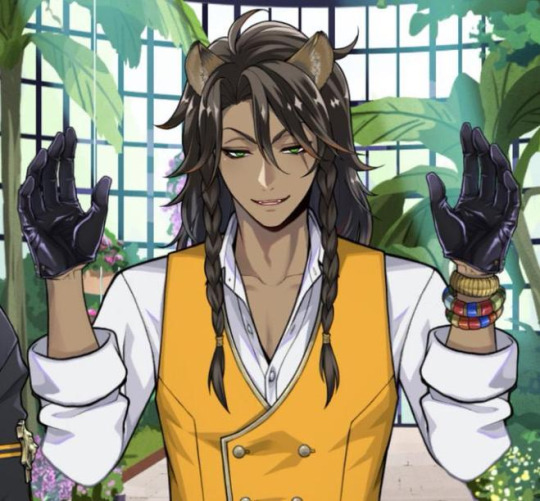
Okay, just to keep it simple, I’ll try to keep things in chronological order!
First is a bullet point list of my thoughts on chapter 6 so far, then all my questions and theories (mostly a biggish theory on Ace) are at the end of the post.
Expectation: Idia cowering in his room, Vil and Rook busting down his door using Epel as a battering ram, dead Ortho theory confirmed
Reality: SWAT TEAM RAID ON NRC, DORM LEADERS (sans Kalim) AND JAMIL GET KIDNAPPED
Admittedly, I’m disappointed to see that the injury Grim inflicted to MC was basically just a cat scratch and nothing more. I thought it would be a lot more impactful if MC had to deal with juggling the realization that Grim has betrayed their friendship and trust while also on the verge of death (or at least while being severely injured)... And given how MC reacted to the attack at the end of chapter 5, I would think whatever struck them was much more substantial than just a cat scratch. I’m going to go out on a limb here and say either the script got scrubbed by Disney, or the intent was that MC was still woozy from VDC / OB Vil, MC felt so betrayed that it shook them emotionally, or that MC was just that weak by default that they can’t defend themselves against cat claws.
Hey, Ramshackle’s finally getting renovated! Proceeds to immediately get destroyed again--
I feel like????????? They tried to retroactively explain why Neige won to try and mitigate the uproar over how VDC ended. There’s some dialogue between the VDC group about how they didn’t perform at their peak because of having just walked out of dealing with OB Vil, and how Neige’s fans were going to vote for him anyway because they resonated with his background. Honestly, I think they should have moved on from that sore spot instead of bringing it up again, even if how chapter 5 ended didn’t personally bother me.
BOOM, HERE COME THE TWST TERMINATORS--
NOT GONNA LIE, THOSE STYX GUYS LOOK HOT SO COOL
AAAAAAND IT’S KIDNAPPING MONTAGE TIME, KIDS
JOABSFHUPAUABDBADB CALM DOWN, RIDDLE??????? YOU’RE GOING TO COMMIT ARSON IN BROAD DAYLIGHT--
Okay, I know this chapter’s focused on Ignihyde and Grim, but the standout part to me (so far) has been the scene where Leona’s being kidnapped. Historically, Leona has not been a character that I like (excluding that one time I had to pretend to like him for a game). I feel like he’s one massive missed opportunity (he didn’t show up much in chapter 2, he’s pretty similar backstory-wise to his Disney counterpart compared to the other Dorm Leaders, he didn’t seem to learn anything or become a better person even a LITTLE after chapter 2, etc.). I’m not a fan of his lazy and arrogant attitude either (even if it is justified by his backstory). But here? THIS IS THE LEONA I ACTUALLY LIKE AND WANT TO SEE MORE OF.
LIKE????? I CAN’T DESCRIBE TO YOU HOW MUCH I LIKE THIS SCENE???? Yeah, we have Leona fighting STYX at first, but as soon as he realizes who they are, he wises up and surrenders because he knows better than to resist arrest. AND NOT ONLY THAT, but he uses King’s Roar in a smart way--to turn the falling greenhouse glass panes into sand so they don’t hurt anyone nearby (namely him and Ruggie).
And after he turns himself in????? LEONA TELLS RUGGIE TO TAKE CARE OF SAVANACLAW FOR HIM!!! THIS is what a real leader would do. He looks after himself and his people, but he knows when to surrender, AND he leaves his “kingdom” (the dorm) in good hands while he’s away. THIS is the Leona I want to see.
AJBDUASHPFBUABFIABIYFBIPFAAFIAF I ALSO REALLY LIKE HIS SASS WHEN HE JUST THROWS HIS HANDS UP AND ASDBIASBIABAIODDAYOFAIPPADAIDB SAYS “I’ll go with you, but be careful while escorting me, okay? Despite my looks, I'm a precious prince. I’ll get sick/dizzy if you drive recklessly.” SARCASTIC SASSY SMARTASS??????? IF YOU HAD MORE LINES LIKE THIS, I’D LIKE YOU MORE
I love how Azul’s still talking about capitalism/how he can profit from Idia (apparently the Shrouds are like the TWST equivalent of Google??????) as he’s being escorted away by the agents?????? IF I WERE HIM, I’D BE PISSED OFF THAT THEY INTERRUPTED MY BOARD GAME????? At least let the man finish first--
Damn, everyone’s being tasered???????? And apparently all the STYX agents are equipped with anti-magic plates? I guess Bind the Heart can just eat shit then--
Lilia’s ringtone is cute, period.
CROWLEY CALLED STYX TO CAPTURE GRIM???? GRIM IS OFFICIALLY A SCP THAT NEEDS TO BE CONTAINED????
WAIT WHAT CROWLEY’S BEING KIDNAPPED TOO??????? Oh well, the school is probably safer in Trein’s hands anyway--
askhlbfbilhidbabbidasb RIDDLE WAKES UP POST KIDNAPPING AND HE’S USING LEONA AS A LAP PILLOW?????!
How does it feel to be held in a room against your will, Jamil? Yeah, don’t like a taste of your own medicine, do you?
OH HI IDIA, NICE YZMA MAD SCIENTIST GETUP YOU GOT THERE
Wait, what????? THAT’S IT?????? SERIOUSLY???????
MAN.
I have so many questions??????? Specifically about STYX and what they do, and how the Shrouds are tied into all of it.
So they say STYX is a specialized unit called in to quell serious Overblot cases. And if Crowley called them to deal with Grim... well, bad times ahead for Grim. STYX has also been studying Overblot for a long time, which is why (I think?) they captured Riddle, Leona, Azul, Jamil, and Vil.
There’s been some allusions made between Grim and Stitch in a lot of fan art and fan theories I’ve seen, since their struggles have some parallels: that being them struggling to decide if they are “good” or “bad”. I don’t know if this was intentional on the part of the TWST writing team, but regardless, it’s a really good concept that plays into the themes of TWST itself. There’s no good, there’s no evil, no black and white--most of the characters we see may be BASED on villains, but that doesn’t MAKE them villains. They are good, and bad, in their own ways--and now Grim is dealing with that crisis as he fights to keep his sanity and avoid completely succumbing to Overblot.
Though Idia seems to be involved with STYX’s research, it doesn’t sound like he personally gave the order to retrieve those test subjects (or at the very least, he’s not happy about roughing up the test subjects), it sounds like the orders came from other people in the organization. His parents, perhaps?
They mention briefly that Idia’s parents are asking him to “come home”, so it must be for something urgent. Are they worried about his safety? But Idia’s lines at the end of chapter 5 lead me to think he is estranged from his family, since he straight up rejected a job offer linked to them (Olympus Corp is owned by the Jupiter family, and the Shrouds are a branch family of Jupier), and says something like “I’m not welcome anywhere”. Has Idia done something to disgrace him from the rest of the family? Or is it more of a self imposed/self inflicted statement, given that he always says he’s “cursed” and acts like he’s guilty of something that deserves scorn?
Why is Idia participating in STYX research, even if it means experimenting on his fellow students (and fellow board game enthusiast Azul)? People are speculating that he wants to use blots to fully revive Ortho (if dead Ortho theory is true), or that Idia actually has heroic intentions (he wants to know more about blots to prevent OBing from happening?), but at this point??? Literally anything could happen?!
In future parts, I’m guessing Pomefiore, MC, and Adeuce will team up to break Jamil and the Dorm Leaders (except Malleus, Malleus got left out again www) out? And HOPEFULLY we get to see Rook’s Unique Magic or at least more screen time, since I feel like he got so little in chapter 5... Another thing I’d like to see is Ace and/or Epel getting their Unique Magic, or at least starting to develop it. It’s really mostly Ace I want more details for.
A theory I’ve been holding onto for a long time is that Deuce getting his UM will spur Ace on to become jealous (since he has always seen Deuce as an idiot/”lesser” than him), and that will cause a rift in the friendship, or for Ace to throw himself into a dangerous situation to prove himself (he has done it before with Riddle)... and has his ass rescued again. This would make Ace even angrier, since he feels like everyone is treating him like a little kid or rubbing it in that he isn’t “as good” as they are. I don’t know where it would go from there (I’m sure TWST would get creative), but ultimately it would culminate in Ace making amends with everyone and rushing in to save them from either Grim or Idia OB.
I don’t think Ace would discover his UM in a similar manner as Deuce (Deuce had to embrace his own stubbornness and straightforwardness, but as the term “Unique” Magic implies, the way a magic develops and manifests is “unique” to the user). While Deuce has to learn to accept his own way of thinking, I believe Ace is already sure of his own way of thinking and has totally accepted it. I think what Ace has to deal with instead is coming to terms with his fickleness. We’ve seen him time and time again treating his loved ones kind of callously, from constantly bullying MC, Grim, and Deuce to ghosting his own girlfriend and flaking on people when they are counting on him to do a task.
The issue with Ace isn’t that he isn’t aware, it’s that he is aware and he seems to think this behavior is totally okay. He demonstrates little to no remorse in what he does and says, and he doesn’t seem to care about the consequences either (how many times does he get punished by Riddle, yet he keeps doing the same dumb things over and over?). Ace appears to operate under the mindset of always being in the right, or (if he’s in the wrong), he won’t really acknowledge it, or he will wave it off as “no big deal”--and I think that’s his greatest weakness.
In the scenario I described earlier, I mentioned that Ace’s jealousy will cause a wedge between him and his friends, and I think this will play into him realizing the error of his ways. When he has finally driven away all of the people that supported him, what will he have left? Nothing. Then maybe Ace suddenly finds himself relating to Idia, or to Grim, who have Overblotted and are in a similar emotional state as he is. Confused and lonely... and that energizes him to pitch in again, even if all he has is wind magic up his sleeve. Everyone could be shocked that Ace has returned, and in that moment, he could finally realize his true potential and unlock his Unique Magic!
(Maybe that’s too specific, but that’s a scenario that I’ve had playing in my head for a long time!)
... Buuuuut given that Ace has gotten little to no spotlight so far in chapter 6, I’m not sure if they’ll lean into him developing his UM yet (unless they pull a chapter 5 and really start addressing Ace in the latter half of the chapter like they did with Deuce). Seeing as chapter 6 is dealing with a lot of heavy topics (death, Grim lore, Overblot lore), I’m thinking maybe the TWST team will push off Ace’s UM development to chapter 7???? The only way I can see it happening in chapter 6 is if the chapter is SUPER long, or if the writing is REALLY good or really bad.
Anyway, I’m keeping my fingers crossed!!! I’m so excited for the rest of chapter 6... I hope that we don’t have to wait too long for it!
#Idia Shroud#Leona Kingscholar#twst#twisted wonderland#Grim#disney twisted wonderland#notes from the writing raven#Lilia Vanrouge#Ortho Shroud#Riddle Rosehearts#Azul Ashengrotto#Jamil Viper#Rook Hunt#Vil Schoenheit#Neige Leblanche#Epel Flemier#Ace Trappola#Deuce Spade#Dire Crowley#Mozus Trein#spoilers#twst analysis#twst theory#twisted wonderland analysis#twisted wonderland theory#Malleus Draconia#Ruggie Bucchi#I'M JUST SPITTING UP ALL MY THOUGHTS#Kalim Al-Asim
369 notes
·
View notes
Text
Name analysis of the Creel family
Virginia creel ( victor creed's wife)
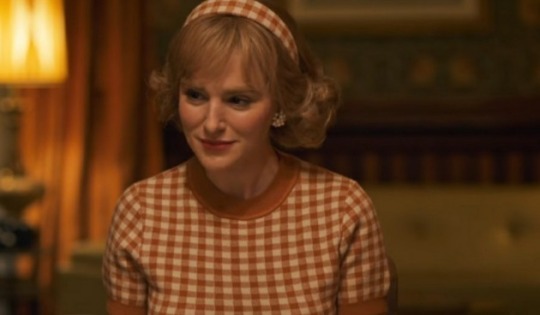
The name Virgina is derived from the Roman myth of a father k*lling his daughter (Virginia) . And is mostly likely foreshadowing of what Mr Creel will do to Virginia and their daughter.
Victor creel
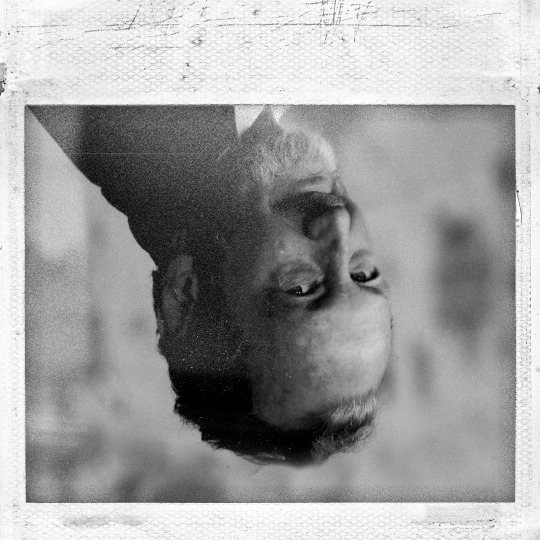
Is probably based off the xmen comic book character victor creed, who k*lled some of his family members. He also had the tradition of ab*sing family members on their bdays. I predicted possessed-Creel will parallel Lonnie. Lonnie made Jonathan cry on his bday & i predict he will visit Will on his bday (based on foreshadowing)- post here. It would make sense , especially given the fact St references the xmen every season. And so they may have used this xmen ref/name to establish a loose connection between possessed- Creel and Lonnie.
Alice creel (the daughter)
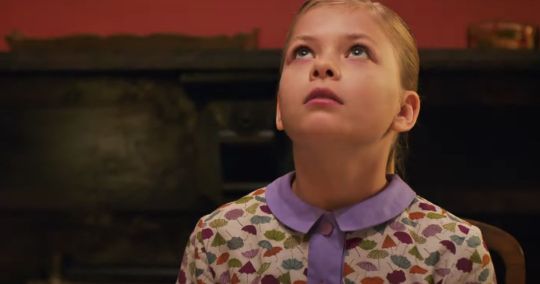
Her name is a tip off that the Creels are constructs of Will's psyche, brought to life-similar to the fantastical world/inhabitants of Alice & wonderland. Which was also referenced in s1.She even is blond similar to the titular Alice. Alice (in s4) is the one to discovers the “de*d “ rabbit. In the original story, Alice follows the white-rabbit , and this causes her to fall down the ‘rabbit hole’ which leads to wonderland. But our Alice finding the “dead “ rabbit indicates the DARK-wonderland they’re about to fall into (as the perfect image of the family starts to unravel) . A “rabbit hole” is also defined as “ bizarre, confusing, or nonsensical situation or environment, typically one from which it is difficult to extricate oneself.” ESSENTIALLY WHAT THE CREEL’S WILL EXPERIENCE.
Hopper also says his depression is like a “black hole” . And Will’s dark thoughts about his past could be the metaphorical “black/rabbit hole” that destroys the Creels.
We also have other rabbit refs.When El is running away from the "bad men" the song "white rabbit" (describing Alice and wonderland )plays. Later we see in Terry's room for El : the same white rabbit, from the story. And Billy (William) Hargrove paralleled/created by Will also has a connection to the rabbit. As the name Hargrove means “grove filled with rabbits”. And Max in s3 also has a rabbit figurine- similar to Terry’s. And Hopper- sounds a lot like “thumper”(the rabbit) which Jonathan references in relation to his father making him k*ll a rabbit. Even “hop” is a word we associate with bunnies. And in s3 Hopper makes an analogy to “rabbits”. So all these characters are associated with rabbits: the hunting story/alice and wonderland. Because they're similarly... constructs of Will's mind: that were brought to life. Similar to how Alice (subconsciously) created wonderland and it's inhabitants via her imagination.
Creel
Is a type of basket used to TRAP sea life such as fish-to later consume and k*ll . A hint something sinister will happen to the Creels. Especially because in the show - water is a sinister element. The watery void, the tub, the isolation chamber where El first sees the demogorgan, Will's fake body in the quarry, Barb being attacked in a pool,and Heather being att*ked in the shower,etc . We also see while eating dinner - Alice has a dress with umbrellas on it . Indicating it’s probably raining outside (and something awful is about to happen). Again it was raining , when the flayed (Heather) knocked out her 2 family members at dinner. And we then see Alice (in the same umbrella dress) on the floor with her brother- as their most likely Flayed-father is looming over them. I’ve seen a lot of people mention the dinner-flayed parallels-such as @small-town-byers (but I don’t believe anyone has mentioned the correlation to Umbrellas/rain).

Son's name is unknown? (Speculation)

I honestly do wonder about this. He parallels Will (both are artists and wear flannel). And his sibling (like jonathan) sees a de*d rabbit. Is there a reason we don't know his name? Unlike everyone else else?
So far we already had Billy whose real name is William (parallel Will) . So will this boy’s name also be a nickname for William?When El is looking into Billy's memories (relating to his ab*sive father) the song playing is even called "William".
Will this boy's name be avoided - and he'll only called William (by his possessed father). once Will realizes that his father is - the real monster ?
Will he simply have another nickname for William not already used in the show (Bill and Billy have been used), so maybe : Liam?
Or perhaps Gill (it’s also a nickname for William) . And, it also correlates to fish (like a fish gill) . Similar to the creel family being a "trap" for k*lling and consuming fish.
Since the demogorgan (which in d&d is a demon called the "deep father") who is described multiple times in s1 as "eating" when k*lling. And the fact, in s1 we see the demogorgan eating his own eggs (aka: his own young/kids). The boy’s name, being a nickname for William and food/fish, and his surname being a fish trap (for fish heading to the sla*ghter)... would be very clever. Honestly, if the Creels were eating fish at this dinner too-before everything goes wrong (I’d lose it , over the symbolism).
It'd also be creepy, if Mr Creel normally calls him "Gill" (rhymes with Will) but calls him "William" when possessed/angry. And maybe they could make that a parallel between possessed-Creel and Lonnie. So if Lonnie is calm he calls him "Will “ but when he starts to get angry/or have sinister intentions: Lonnie calls him "William". It would give the context of playing the song "William" during the Billy's flashbacks of his father - a different context. Also would give Max saying "max , never Maxine" + Will in s3 calling Mike "Michael", a sort of dark foreshadowing...
But who knows his name could be a different reference entirely. XD
88 notes
·
View notes
Text
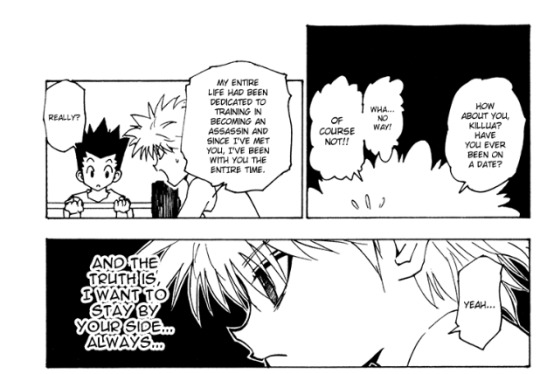
I tend to see a lot of people say that Togashi will leave things uncertain and ambiguous in between Killua and Gon, and while it’s a possibility, I honestly don’t think it’s the most likely thing to happen, and if it did, ambiguous wouldn’t be the correct term to call it.
People often say that Togashi likes to play with ambiguity when it comes to queer matters. Yes, Togashi likes to play with gender. We get to see that through Kite, Pitou and Kalluto in HxH (although its arguable because Kite is definitely not cis). But when Togashi decides that a character is queer, or that there is a relationship going on between two characters, he doesn’t leave it ambiguous.
Togashi has created queer characters in 3 of his main works : Yu Yu Hakusho, Level E and Hunter x Hunter. And everytime he created those characters, he made damn sure that everyone knew that these characters were queer. No room for any sort of ambiguity.
The first examples I have are from Yu Yu Hakusho, with a character named Miyuki, and the other is from Level E, with a character named Kyoko Mikihisa.
For these two characters, Togashi made it so that they emphasized themselves that they were trans. It’s painted extremely clearly, that they were born in the wrong body. There’s literally no room for any sort of ambiguity here.
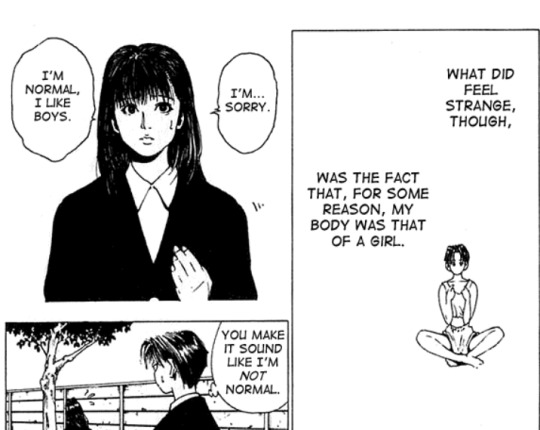
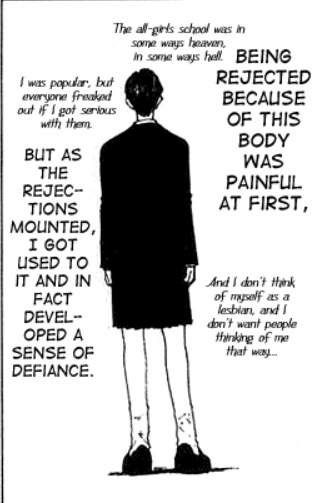
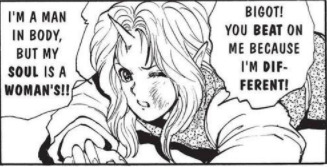
Togashi could’ve easily kept things ambiguous. There are plenty of ways he could’ve done it, keeping the character’s gender confusing. But he didn’t. He made it EXTRA clear that these characters were trans. This is mostly why I genuinely don’t believe you can describe Togashi’s queer rep as “ambiguous”. Because when the characters tell you themselves that they are, it’s canon. It’s not ambiguous.
Now, sometimes, Togashi likes to play it more subtle. He doesn’t make his characters say “I’m gay” or “I’m trans”, but he finds another way to say it.
In YYH, Togashi wrote a gay character : Itsuki. And he’s canonically gay, because when talking about another man, Sensui, he mentions that he sees him as a lover.

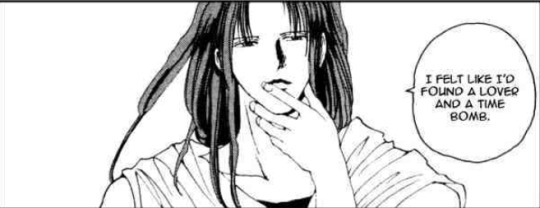
It’s subtle. It’s not ambiguous.
Same thing for Alluka, Alluka never comes on screen and says “I’m a trans girl !”. The reason we know that Alluka is canonically a trans girl is because the Zoldycks insist on misgendering her, while Killua emphasizes that she’s a girl.
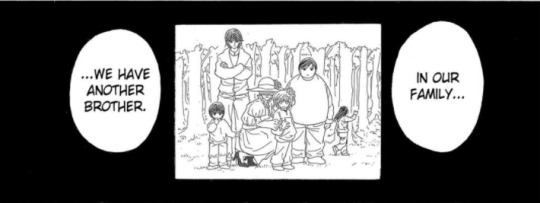
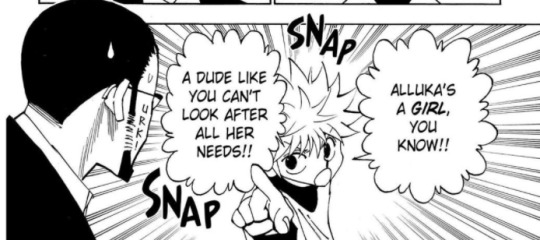
And once again, it’s subtle. Not ambiguous. Even though I’ve seen a lot of redditors say that “Alluka’s gender is ambiguous”, Togashi is literally doing his utmost to highlight subtly that yes, Alluka is a trans girl.
But subtlety is not canon’s enemy. Not everything has to be painted clearly for it to be canon. Sometimes, you just have to piece every little clue together yourself. Just because the word “trans” is never canonically stated in HxH concerning Alluka, it doesn’t make her any less of a trans girl. Because as the audience, we UNDERSTOOD from the subtext and from the clash in gendering that she is trans.
So, yes, Togashi likes to be subtle. But subtlety doesn’t make things any less canon.
I’m drifting a bit to non-queer matters, but I also want to talk about two relationships in Togashi’s work that were canonically romantic, but subtle.
The first is Meruem and Komugi. It’s canon that the nature of their relationship was romantic. They never did couple-y things, or even kissed. But it doesn’t make the nature of their relationship ambiguous. Because it was once again, subtle, but drowning in subtext that Togashi deliberately put there.
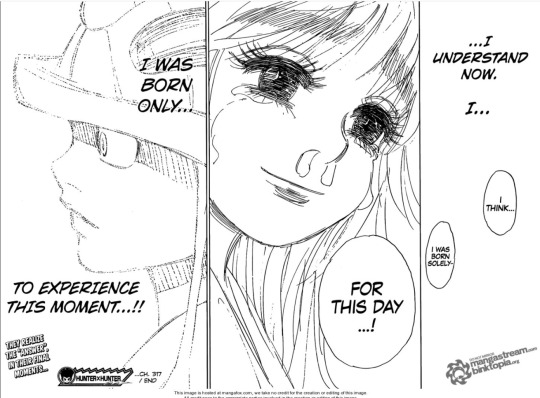
Togashi paralleled Killua saying that him dying with Gon would be a shinjuu (lover’s suicide), only for it to not happen in the end - but Togashi wanted to throw that word in. So we could have it at the back of our heads. Because when Meruem and Komugi died, it was a shinjuu. It was two lovers dying by the same method with the belief that they’d be united in the afterlife. Meruem only cared about spending his last moments playing with Komugi. They both said that they were only born to experience this moment, of being in pure bliss as they die together. When Komugi replies to Meruem and says that she’ll join him in death, she uses an old phrasing used to accept marriages proposals. They died holding hands.
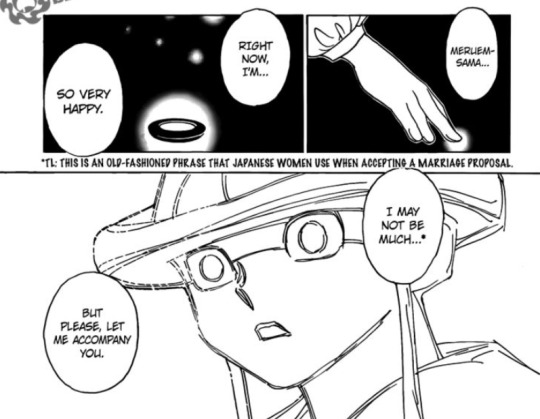
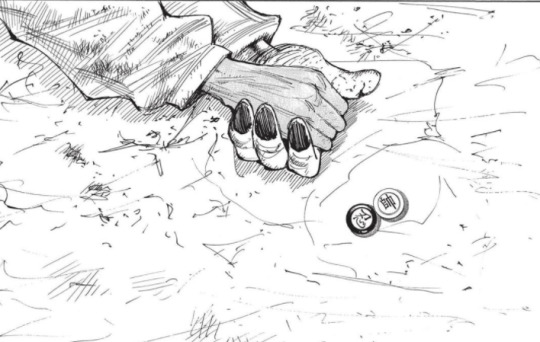
It was subtle, but canon. Because of all these clues and all the subtext Togashi planted, it is undeniable that their relationship was romantic. And they never kissed, never said “i love you”, but we still know : and that’s the beauty of subtlety.
Because yes, romance can be subtle AND canon.
Another example of a canon romantic relationship that was never officialized by a kiss : Keiko and Yusuke in Yu Yu Hakusho. Correct me if I’m wrong, but while they kissed in the anime, they never kiss in the manga.
But a relationship doesn’t need to be canonized by a kiss. I’ve never seen/read YYH, but while I was doing research, I read that their relationship grew naturally over the course of the manga. That they grew together, were affectionate with each other, but never told each other the nature of their feelings. Until one specific moment towards the end of the manga where this happens:
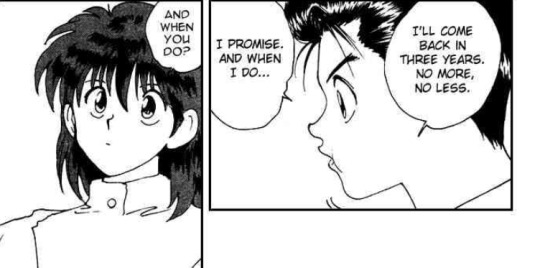
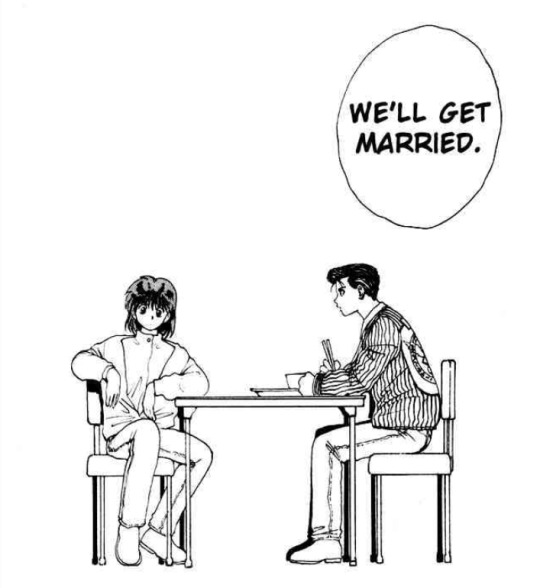

All of this came naturally. No big confession, just a confirmation of what they both felt. And no kiss either ! No hand holding, no true “romantic” actions, either before or after that chapter. Just feelings. I’m quoting one of the post I used as reference, but “On one hand it's beautiful to finally hear it, but on the other, it's not even surprising. You find yourself caught off guard by how easily you're willing to accept that these two have felt this way throughout the entire series.”
And while it’s subtle, because you’d expect at least a kiss or something, it’s canon and undeniable that their relationship is romantic. It’s clear that the two of them are in love, even if they never kissed. Because it was clear from the beginning that this was where their relationship was going : all the building up to that one moment where they both basically tell each other “oh yeah, btw, i love you”. A simple confirmation of what they both knew, and of what we as readers knew too.
I guess my point is that Togashi can insist on the nature of his characters and relationships. He insisted that Miyuki, Mikihisa and Alluka were trans. But sometimes he also likes to be subtle, and not put everything plainly. But the subtlety doesn’t discredit its the canon legitimacy.
Now, onto what it means for Killua and Gon.
I emphasized that Togashi liked to highlight when his characters are queer. There are absolutely NO DOUBTS that Miyuki and Alluka are trans girls, Mikihisa a trans man and that Itsuki was gay. It’s in canon. But they were all brought up differently, and it was either confirmed by them saying it themselves or by the context and subtext surrounding their queer identity.
But Togashi never left it ambiguous. We always had canon confirmation that they were queer. What I’m saying is, there’s a very, very high probability that Killua is gay and in love with Gon. We’ve seen it in the incredible amount of subtext deliberately placed by Togashi. And like I said, Togashi never left the nature of his queer characters ambiguous. So it’s highly likely that Togashi will confirm in canon at some point that Killua is gay.
Now, while it’s likely Togashi will canonize Killua being queer plainly by either him saying it or subtext (just like Alluka), it doesn’t mean that his relationship with Gon will be canonized plainly too.
I mentioned earlier that Komugi/Meruem and Keiko/Yusuke’s relationships were subtle, while undeniably romantic. So maybe this will be the case for Killua and Gon’s relationship too. It looks like Togashi’s style for writing romance is show, not tell, thus making it a possibility that it’ll be the same for Killua and Gon.
But I can assert with 100% certainty that Togashi will NOT leave their relationship ambiguous. Maybe it’ll be subtle, but NOT ambiguous. Just like Meruem/Komugi and Yusuke/Keiko.
Killua and Gon’s relationship is the backbone of HxH, and it’s very clear that Togashi’s intent from the beginning of the story was to canonize it as a love story. When Togashi wrote Killua, he incorporated elements of Tanabata, a legend about two lovers, in his story, and made Tanabata his birthday. Togashi queer coded Killua from the beginning, and I honestly doubt that he would never canonize it, when it was his intent to queer code him from the beginning. He made the both of them have an extremely deep relationship, being each other’s most important person. Combine this with all the subtext, and yeah, it’s pretty clear that HxH is a love story.
So yes, Togashi wouldn’t leave ambiguous something he planned from the beginning of the story. Especially since HxH is his first chance at writing a manga and being able to do everything he wants with it. Especially when Togashi’s gay manga got turned down 30 years ago.

I mentioned Togashi never leaving stuff ambiguous, but rather either putting it plainly or more subtly. And honestly, I’m thinking it’s going to be a mix of both for Killua and Gon. A mix of subtlety and undeniable proof of the romantic nature of their relationship. Exactly like Yusuke and Keiko’s relationship.
I feel like Killua and Gon’s relationship perfectly mirrors Yusuke and Keiko’s, and I can totally picture it following the same patterns. By having their relationship grow even deeper as they reunite, with no explicit romantic gestures, just deep, deep feelings. Until ultimately, they both confirm it one way or another.
I could literally picture Gon turning to Killua, telling him out of the blue something they’ll do when they get married, Killua being confused but Gon saying something like “Well, I wanna get married to you Killua. Don’t you want to?” and Killua almost choking but saying that yeah, he’d like that. Plain and simple. No romantic gesture. No kiss, no hand holding, no feelings confession under the stars. Just a mutual assessment of what they both already knew.
But honestly, I’m saying all this to try and be objective, but I’m not in Togashi’s head. Togashi could also very much go absolutely crazy and make Killua and Gon share a kiss, hold hands, affirm their love out loud, Because it’s his first chance at being free to do what he wants with his manga. And because he’s been wanting to draw a gay manga for a while, he might want to emphasize that HxH is queer.
Especially when it seems like Togashi likes to incorporate shoujo elements in his work.


And as @/sincerelysamedt mentioned in her wonderful post, queer relationships are often dismissed as platonic in media, and that it’s important to overplay it to canonize it efficiently. And Togashi is probably aware of this. Hence Killua’s stuttering, blushing, the constant gay poetic lines Gon tells Killua about how he’s so glad he met him, Killua’s inner monologues comparing Gon to light itself, multiple characters highlighting their mutual love, a date under the stars where they mutually affirm their want to stay together and travel the world while they both blush.........Togashi didn’t have to go THIS hard, but he did.
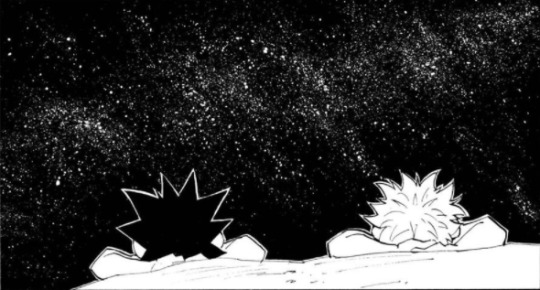
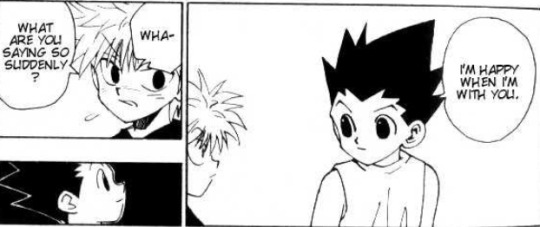
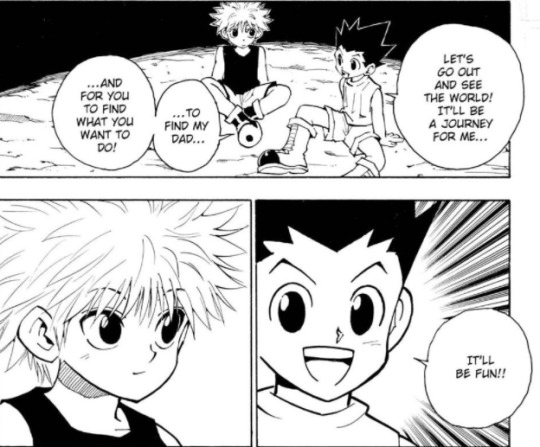
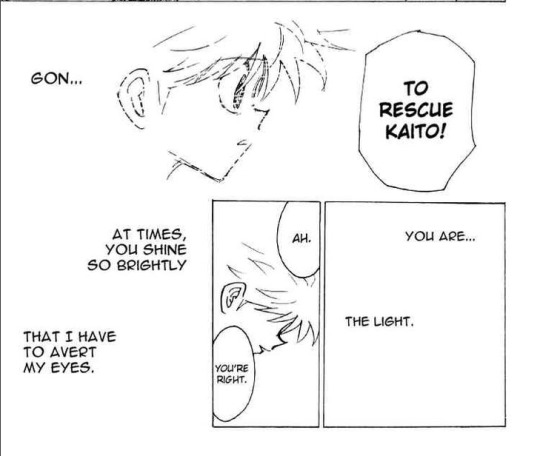
These panels highlight the difference between the subtle relationships I talked about above. Correct me if I’m wrong, but I don’t think Togashi represented Yusuke or Keiko having internal monologues about how they wanted to stay with the other forever or poetically comparing each other to light. It proves that while Togashi likes to play it subtle, he's also not afraid to put extremely cliché shoujo tropes and heartfelt moments in his narrative too. Maybe he’s aware that internalized homophobia might pose a problem to the narrative he’s trying to convey, and thus he might be enclined to overplay it.
When you keep in mind that Togashi most likely wrote Killua and Gon with the intent of making their relationship a love story, you can see that he’s never really written with the intent of being ambiguous or even subtle, providing us with multiple intense scenes of mutual devotion. And that’s one thing that’s leading me to believe he wouldn’t shy away from delivering highly emotional scenes that would canonize their mutual love. Because their relationship has never truly been portrayed as subtle, or ambiguous, it’s just.... developing.
So yeah, it could go either way ! Either Togashi will decide to paint it subtly like every relationship he’s painted in the past, or he’ll either decide to go all out and maybe show us an extremely heartfelt confession under the stars, maybe even an on-screen kiss (the latter option being highly likely considering all the very emotional scenes between them we’ve already had) - (EDIT : i wrote a post on why i believe there’ll be an explicit confession if you want to read it !)
But one thing is certain : it will never stay ambiguous, because Togashi has never painted any of his queer characters or the relationships between his characters as ambiguous, Subtle, yes. Ambiguous, no.
#hxh#hxh meta#meta#my meta#killugon#ok hi hello this is my attempt at trying to stay optimistic#full disclaimer that i am not togashi and therefore i dont know wtf is gonna happen#but im pretty sure that togashi wouldnt leave this ambiguous#when u look at his past history and writing style and the context of hxh#when u see how apeshit he went with all the romantic scenes in hxh#imo killugon is not ambiguous its literally just developing#and togashi has NEVER left major relationships ambiguous in his works#he wouldnt leave the backbone of his manga ambiguous#especially when hes planned to canonize it from the beginning#hes just taking his time to portray it in a very heartfelt and natural way#but i have no doubt in my mind that by the end of hxh itll be undeniable#just like his past portrayal of relationships and queer characters#im HOPEFUL#and he might do like his wife did : emphasize the canon legitimacy in an interview
1K notes
·
View notes
Text
The Evolution of Will Graham’s Darkness
This meta is mostly written for new viewers who find themselves confused by Will as a character. I’ll incorporate some bits of analysis I’ve written before into it. Let’s start with a thesis of a sort: Will is a dark character who had this darkness from the very start, even before his encounter with Hannibal: he was terrified and disgusted with it, but after meeting Hannibal, slowly, he began to embrace himself, getting bolder and bolder in his violence.
**Before the show**
Will initially tried to get into the FBI but he didn’t pass the tests. It’s revealed in E1 of S1 when he’s ambushed by Beverly.
Beverly: Never been an F.B.I. Agent?
Will: Strict screening procedures.
Beverly: Detects instability. You’re unstable?
At the same time, Will became a police officer, working in the Homicide department. These decisions show that he's been stubbornly and rather hopelessly drawn to darkness, seeking ways to interact with it while remaining on the side of law. However, he had to leave the police, too, because he was incapable of pulling the trigger even when his life depended on it. He preferred to allow himself to get stabbed rather than to fight back and kill someone, which points to him having very serious issues with his violence. He knew that once the door in him opens, it might not close again, that if he kills or harms another person, he might be unable to stop (this is proven when he shoots Hobbs and then immediately tries to kill Stammets).
And still, Will chooses to stay close to darkness, only in safer ways. He becomes a teacher in the FBI Academy, letting himself delve into the ugliest cases from a theoretical perspective. This constant pull and struggle leave Will lonely and hostile to everyone. He avoids eye contact with people; Jack’s first impression of him was that he’s rude and arrogant (when they clashed about the name of the museum). Will is rude and haughty with his students, too – but more about it later. Alana refuses to stay alone in the room with him, thinking his instability is too fascinating and she might want to dissect it. Will has no friends; he lives in isolation with his dogs, someone who would never judge him. There are a lot of rumors about him going around, and most people don’t like him (based on Price’s and Zeller’s initial reactions as well as their later conversations on this topic). Will is lonely and pretty miserable.
S1
The first real words we hear from Will are:
Will: Everyone has thought about killing someone.
It is very demonstrative of his personality. We also get evidence right here that Will is drawn to darkness primarily, not to the idea of saving lives (although the latter helps him feel better about his urges). He delves into the minds of killers even when he isn’t involved in the investigation. He had no other reason to explore the Marlows’ murder like he did at the start of the episode, when he was simply teaching students. It’s proof that he willingly craves contact with violent and disturbed minds — it’s not like he actually tries to solve this case for real, he just imagined himself there.
Will’s first conversation with Hannibal speaks volumes about who he is — because Hannibal senses it seconds after meeting him.
Hannibal: Do you have trouble with taste?
Will: My thoughts are often not tasty.
Hannibal: Nor mine. No effective barriers.
Will: I make forts.
This exchange has Will confess that his thoughts are often dark and that he dislikes it. To hold this darkness at bay, he literally builds forts around it, not letting it spread to other parts of his mind.
Hannibal: Your values and decency are present yet shocked at your associations, appalled at your dreams. No forts in the bone arena of your skull for things you love.
Hannibal almost directly calls Will out on his struggle with his inner darkness. He’s saying that he sees it, that he knows it’s there, in Will, in his mind, and Will is very disturbed by this — because Hannibal is right. The script even explicitly backs it up:
Hannibal has just described Will Graham to a letter.
Will is immediately wary and hostile, and he ends the conversation with snappy,
Will: Please don’t psychoanalyze me. You won’t like me when I’m psychoanalyzed.
What does it mean? It’s simple: Will assumes that Hannibal is a typical psychiatrist who wants to dissect him, so he says that once it happens, Hannibal won’t like what he finds (darkness and ugliness Will carries inside).
His hostility to Hannibal lasts up until the moment when Hannibal acknowledges him as a predator and shows approval of it. This is how it happens: Hannibal tries to subtly tell him that it’s all right to be who he is, hinting that they are the same.
Hannibal: You and I are just alike. Problem free. Nothing about us to feel horrible about.
He’s obviously talking about their darkness, but Will doesn’t react, so Hannibal continues. He tells him that Jack views him as a fragile tea cup, and Will genuinely laughs, amused by this (which is also very telling). Then Hannibal says:
Hannibal: [I see you as the] mongoose I want under the house when the snakes slither by.
Will grows quiet after this, and then his interactions with Hannibal become much more relaxed. Will takes him to search the property and even bothers to explain how they reached their conclusions and what they are about to do. Him grumbling, “What are you smiling at?” shows a much higher level of familiarity they now share. Something in Hannibal’s words made Will open up a bit, and everything indicates that it’s the acknowledgement of his predatory nature that played its part in it.
Will kills Hobbs by shooting him 10 times. This is his first kill, one he’s been trying to avoid for so long, ever since his police work. It’s not surprising that Hobbs haunts him later because his death became a breaking point for Will. A door did open in him, and he was unable to close it again.
In E2, Will is distraught. But first, we get a glimpse into how rude and insensitive he generally is. Look at how he treats his students. He tersely thanks them for clapping and then snaps for them to stop. He devises a little malicious test for them.
Will: It’s [Hobbs’] resignation letter. Anybody see the clue?
A few hands go into the air. Will ignores them.
Will: There isn’t one.
He looks so long-suffering with them, as if they are idiots. The fact that he asks a question, waits for people to think and raise their hands, and only then he tells them there is actually no answer is petty at best. He also admits to Jack that he doesn’t consider lessons socialization because he doesn’t have to actually talk to students, he talks at them. Not good for a teacher or even for a person who works with other people like this.
But Will has more serious problems. He keeps imagining Hobbs, and after his messy kill, Jack becomes worried about him. He makes Will go visit Hannibal for one-time evaluation. Will is naturally not fond of the idea, but he and Hannibal have a pretty personal talk. Hannibal ends it with an even more explicit hint at Will’s own darkness:
Hannibal: And Will… the mirrors in your mind can reflect the best of yourself, not the worst of someone else.
Hannibal is talking about Will’s personal brand of violence again. He’s trying to tell him that it’s fine to be a murderer in every way he can, that Will’s darkness might be the best part of him. He also gives him a fake official approval to work in the field, showing that Will can trust him. But their obligatory session ends and Will leaves — only to return after he tries to kill Stammets and misses (their talk about it was cut from the episode but is echoed in the conversation below).
Hannibal: [You are here to] prove that sprig of zest you feel is from saving Abigail, not killing her dad.
Will: I didn't feel a sprig of zest when I shot Eldon Stammets.
Hannibal: You didn't kill Eldon Stammets.
Will: I thought about it. I'm still not entirely sure that wasn't my intention when pulling the trigger.
This is a huge evidence of Will struggling with his violence. It proves that he had it before becoming actively involved with Hannibal — all Hannibal did was recognize it and coax it to come to the surface. Will has always been like this, and after finally killing a person, he found himself unable to stop because he liked the feeling too much.
Hannibal: It wasn't the act of killing Hobbs that got you down, was it? Did you really feel so bad because killing him felt so good?*
Will: I liked killing Hobbs.
Hannibal is pleased to receive the confirmation of what he sensed in Will. Seeing that Will is terrified about his own confession, he comforts him.
Hannibal: Killing must feel good to God, too. He does it all the time, and are we not created in his image?
Let’s be honest, every sane person would have run for the hills after hearing this. Hannibal literally justifies the fact that Will liked murder by drawing a parallel with God. That’s such a narcissistic, serial killer thing to do, and yet Will welcomes it with open arms. He’s happy to find someone who doesn’t think he’s a monster — he’s relieved to be able to finally discuss his darkest impulses freely. This is the reason why Will started coming back to see Hannibal on a constant basis, to Jack’s surprise.
The next huge proof of Will’s ever-present darkness is found in E5 (actually, every episode has some bits, but I’ll cover only the major ones). The Angel Maker, a killer-of-the-week, has a unique gift of being able to see if a person is good or evil. First, Hannibal tries to tell Will that he doesn’t have to self-destruct because of his darkness like he’s been doing.
Hannibal: Angel Maker will be destroyed by what’s happening inside his head. You don’t have to be.
When Angel Maker dies, Will suddenly sees himself through his eyes. And he sees a demon. He sees himself as evil. It proves that Will’s darkness is inherent since he hasn’t done anything really bad at this point. It also proves that he’s perfectly aware of who he is and the darkness he has. He has the following conversation with the imagined Angel Maker.
Angel Maker: I see what you are.
Will: What do you see?
Angel Maker: Inside. I can bring it out of you.
Will: Not all the way out.
So, Will acknowledges that his darkness is rooted so deeply inside him, it can’t even be extracted fully. It’s an inseparable part of him.
Will is shown admiring the Ripper’s murders, calling them elegant and referring to them as art. Meanwhile, he’s trying to half-heartedly flirt with Alana, but they don’t have a meaningful connection because Will can’t be happy with a person who doesn’t know him. He wants to be normal but he just isn’t. If you’re interested in my opinion about their relationship, it’s here.
Will’s next morally gray action happens when he agrees to cover murder for Hannibal and Abigail in E9. He agrees quickly and then he’s shown being fiercely devoted to it. He doesn’t seem to care that Abigail killed someone much — in fact, he basically threatens Freddie, another person who sees him for who he is, to make her write a book favorable toward Abigail.
In E13, Hannibal says what he wants from Will directly.
Hannibal: If you followed the urges you kept down for so long, cultivated them as the inspirations they are, you’d become someone other than yourself.
Will remembers this phrase (he later throws it back into Hannibal’s face), but for now, he’s too angry and bitter to listen.
S2
Will is healthy again and he struggles with realization that Hannibal betrayed him. He starts a dark game of his own: he pretends he’s vulnerable, moving Alana to tears in the process, and asks Hannibal for help. He’s still drawn to him, but he also wants to take him down — for himself and for Abigail.
In E1, Hannibal tells Will the purpose of all their past meetings, how they were aimed at helping Will Become.
Hannibal: Our conversations, Will, were only ever about you opening your eyes to the truth of who you are.
Alana tries to hypnotize Will to help him remember what happened.
Alana: Imagine yourself in a safe and relaxing place... safe and secure here, safe to relax completely...
What does Will imagine? He sees Hannibal’s room and them sitting at the murder table together. He’s freaked out by it, but it proves how twisted his perception is: regardless of the betrayal, a part of him understands that Hannibal is the only person who’s ready to accept him, and he feels safe with him. @bloodsmile wrote a great meta about it here.
Will coldly manipulates Beverly, refusing to help her save lives unless she helps him as well. In E5, he engages in yet another manipulation. He gets Matthew Brown to try to kill Hannibal. This is the first premeditated murder attempt Will is responsible for. That is why we see him growing horns, that is why he sees a sink full of blood — his darkness starts progressing in noticeable ways. By E7, Will has figured out that Hannibal really did everything to open his eyes to the truth of who he is and that he wants to be his friend, but as he still wants revenge, he decides to honey-trap him with Jack.
In E8, Will is dealing with his complex feelings for Hannibal and explores his darkness further. He admits that Hannibal made him feel less alone and that he doesn’t hate him, no matter what; that he has no idea what he feels for him. Then Will tries to kill Ingram in cold blood as revenge for Peter. He asks him to pick up the hammer, indicating that he plans for the murder to look like self-defense. Hannibal tries to talk him out of it, but Will still pulls the trigger. It’s by a miraculous accident that Hannibal manages to stop him. This is the second conscious murder attempt by Will.
In E9, Will has a dream about Hannibal, love, and darkness.
Dream Hannibal: Must I denounce myself as a monster while you still refuse to see the one growing inside you?
Meaning: Will is fully aware of both the presence of this monster inside him and his attempts to ignore it since this is his dream.
Dream Hannibal: No one can be fully aware of another human being unless we love them. By that love we see potential in our beloved. Through that love we allow our beloved to see their potential. Expressing that love, our beloved's potential comes true.
So, a part of Will realizes that Hannibal loves him, and that he really wants him to Become, to realize all his potential.
Will is shown as feeling bitter at Hannibal for not letting him kill Ingram.
Will: I regret what I did in the stables.
Hannibal (thinking Will means murder attempt): Then you were lucky I was there.
Will: Being lucky isn't the same as making a mistake. Mistake was allowing you to stop me.
Hannibal: So it’s not pulling the trigger that you regret. It’s not pulling it effectively.
Will: That would be more accurate.
Hannibal: I want you to close your eyes, Will, and imagine a version of events you wouldn't have regretted.
Will obeys, and he sees himself murdering Ingram. It proves that every word he says to Hannibal is true — he really does regret not killing him. But there is an even creepier dialogue ahead.
Hannibal: What did you see?
Will: A missed opportunity… to feel like I felt when I killed Garret Jacob Hobbs. To feel like I felt when I thought I killed you … a quiet sense of power.
This is disturbing. It proves once again that Will isn’t just a righteous killer, he enjoys the act of murder itself, and like many serial killers, he craves the feeling of power that comes with it.
He and Hannibal talk about the intimacy of murder, how Will was hiding behind a gun when he tried to kill Hannibal back in E5. Will takes note of it. Hannibal, remembering Will’s complaint about a missed opportunity, sends Randall to him as a gift. When Randall breaks into Will’s house, Will is shown thinking and then deliberately throwing the gun away. He doesn’t want to hide this time — he attacks Randall with his bare hands. This isn’t about self-defense or justice, this is about Will trying to experience a more intimate kind of murder. He beats Randall up until he’s incapacitated and then he snaps his neck, even though there was no reason to do it. He could easily call Jack and have Randall arrested at this point (since he was barely conscious and not fighting back). This could help him in his plan to catch Hannibal. But Will isn’t particularly concerned about it, he’s more interested in realizing his darkness.
He takes the body to Hannibal. This moment got deleted, but Will actually had to stick a note to it:
A piece of paper is pinned to his chest. On it is written: "Return to Sender."
Which excellently shows Will’s dark humor. He laughs with Hannibal a little as they talk about murder right above the corpse. Then Hannibal is treating his hands, and he says:
Hannibal: Stay with me.
Will: Where else would I go?
Nowhere — because Will understands that Hannibal is the only person who can understand his darkness and accept him for who he is.
Will: I've never felt more alive than when I was killing him.
This is, once again, huge. Will is a murderer who can get dangerously high on the act. The moment when he felt most alive is the moment when he took a life from another person — and he was vicious about it. Will is very, very dark in these scenes — and it’s going to get worse.
Will mutilates the body and places it in the museum. He keeps Randall’s suit in his house as a trophy, and he keeps his butchered parts of meat in his fridge. In the following discussion, Will confirms that he enjoyed doing all that. When Hannibal suggests that Randall’s killer felt disdain for him in front of Jack, Will disagrees.
Will: He isn't mocking him. This isn't disdain. He's commemorating him.
Hannibal: This killer has no fear for the consequences of what he's done.
Will: No guilt.
Then Will retreats into his mind to talk to Randall’s corpse.
Will: Hello again.
Randall: Come closer … Can you see you?
Will: Clearer and clearer.
This proves Will’s honesty in all his discussions with Hannibal. He really is exploring his violence, not just pretending to do it, coming to the realization of what kind of monster he is.
Will: You forced me to kill you.
Randall: I didn't force you to enjoy it.
This takes place in Will’s head, so every word is genuine.
Will: I gave you what you want. This is who you are. What you feel finally matches the reality of what I see.
Randall: This is my becoming. And yours.
Will shakes his head, this is not his becoming.
Will: This is my design.
So, what do we have here? Will calls murder, mutilation, and storage of Randall’s meat his design. It’s not his Becoming, not yet, Will isn’t ready to fully embrace himself, but this is a start. He understands his design now.
In the same E10, Will attacks Freddie when she discovered his trophies. We know he didn’t kill her, but would he have done it if she hadn’t called Jack? We can only guess. Will sure took his chance to be creepy and physically violent with her. At the end of the episode, he brought Randall’s meat to Hannibal and they cooked as well as ate it together. This was not about getting Hannibal to trust him. Hannibal already did, especially after thinking Will killed Freddie, so there was simply no need for it. Bryan Fuller confirmed Jack had no idea this happened, so Will was acting on his own, out of his genuine curiosity. This is where he willingly became a cannibal.
In E11, Will dreams of burning fake Freddie and hears himself screaming. It’s easy to interpret this dream: he feels guilty for betraying Hannibal. Alana comes by and Will is being deliberately creepy again. He gives her a gun for protection, but later, it almost becomes her undoing. Will is equally creepy during the funeral. He enjoys being dark, and he feels free to act like this because technically, he has an excuse.
In E12, Will is freshly angry at Hannibal. He fantasizes about murdering Hannibal in the most violent way possible. Then he makes three deals. The first one is with Mason: they agree to kill Hannibal together. The second one is with Hannibal: they tentatively agree to target Mason together. The third one is with Jack: they agree that when Hannibal tries to kill Mason, Will is going to arrest him. Will goes with his and Mason’s plan at first. Hannibal is kidnapped and presented in front of Will just like in his fantasy. But instead of acting on it, Will chooses Hannibal and frees him, getting all Mason’s people killed in the process. Later, he watches Hannibal mutilate Mason, approach him to kill him, and snap his neck. He does nothing: he ignores his deal with Jack completely and covers for Hannibal. Yet another proof that Will is siding with Hannibal more and more, and that his initial honey-trapping plan is almost a formality at this point. At the end of the episode, Will offers Hannibal to kill Jack.
In E13, Hannibal and Will are getting ready to kill Jack while Will and Jack are getting ready to arrest Hannibal. Will doesn’t seem to know on whose side he is until the end. At the same time, he lies to Jack about where the attack is supposed to take place. He helps Hannibal burn all evidence, even though he could have easily preserved some of it to use it later. He burns the evidence related to himself as well. Will doesn’t take Hannibal’s chance to run away before dinner, but he does hesitate and wonder about it. When the final moment comes, he calls Hannibal to warn him — he chooses him above everyone. Justice for Abigail, justice for himself, the desire to save other people — none of it matters to Will now. He made his choice, he chose his side, but he did it too late. When he goes to Hannibal’s house, Alana tells him that Jack is still inside, and Will takes out his gun. He doesn’t even try to point it at Hannibal. When Hannibal accuses him of lying, Will implies that he’s wrong.
Hannibal: I gave you a rare gift… But you didn't want it.
Will isn't so definitive.
Will: Didn't I?
Because yes, Will wanted it. He was ready to accept it. But he did so too late.
S3
Will’s thoughts are only about Hannibal and Abigail. He breaks into Hannibal’s empty house and sits there in silence. When Alana comes to find him and tries to talk to him, he coldly sends her away. He’s repairing a boat to go after Hannibal. When Jack comes to him to ask about his motivations, Will is very open — he doesn’t care about hiding any more.
Jack: Do you remember when you decided to call Hannibal?
Will: I wasn't decided when I called him. I just called him. I deliberated while the phone rang. I decided when I heard his voice.
Jack: You told him we knew.
Will: I told him to leave. Because I wanted him to run.
Jack: Why?
Will: Because he was my friend. And because I wanted to run away with him.
In Italy, Will is full of regret over his actions. He blames himself for what happened, admonishes himself for lying to Hannibal. E2 shows his state of mind perfectly – Hannibal is his everything and he admits he wants to be with him. He doesn’t care about justice at all.
Will: I do feel closer to Hannibal here. God only knows where I would be without him … He left [me] his broken heart. He misses [me]. [I] still want to go to him? Yes.
He admires the corpse twisted into a heart, touching it and then lying at the place where it was located. He intimidates Pazzi who tries to talk sense into him and indicates that he’s not here to catch Hannibal.
Will: You couldn't catch him when he was just a kid, what makes you think you're going to catch him now?
Pazzi: You.
A small, polite scoff from Will, unable to take his eyes off the small stairwell to the catacombs.
Will: What makes you think I want to catch him?
Later:
Will: You shouldn't be down here alone.
Pazzi: I’m not alone. I'm with you.
Will: You don’t know whose side I’m on.
Pazzi stares at Will, cautious.
Pazzi: What are you going to do when you find him? Your Il Mostro?
Will: I'm curious about that myself.
Pazzi: You're already dead, aren't you?
Other people realize how dark Will is, too.
Then we move toward Will’s trip to Lithuania in E3. His reverent attitude to Hannibal begins to change once he meets Chiyoh, but he admits the following:
Will: I’ve never known myself as well as I know myself when I’m with him.
Will learns that Chiyoh has been staying here for all these years because she doesn’t want to kill another person. He notes that they can’t be sure whether her prisoner really killed Mischa because Hannibal is the only person who knows the truth. Despite all this, Will sets Chiyoh up to kill or be killed, releasing her prisoner secretly. Chiyoh rightfully accuses him of it:
Chiyoh: You said Hannibal was curious if I would kill. You were curious, too.
He was, if he is honest with himself.
What Will did was cruel and violent. Hannibal just left Chiyoh be, he openly and boldly risked her life, not caring about her safety or about whether her tortured prisoner deserves this. Will stays behind to make the body into art in Hannibal’s style, in accordance with his own design from when he killed Randall. This Will is dark and confident, and very in touch with his dark side. He dreams of killing Chiyoh and keeps asking her whether she saw what a monster she was, unable to accept the idea that only he has real darkness while Chiyoh doesn’t and that murder didn’t make her feel good. He repeats to Jack that a part of him will always want to be with Hannibal. Sadly, he then sees Bedelia as his replacement, grows even bitterer, and tries to attack Hannibal with the knife.
In E7, Will bites into Cordell’s cheek and tears a piece of meat out of it. Then he looks at Hannibal to see his reaction, waiting for his pride. He shows zero reaction to the news that Jack is alive — he doesn’t care about it. He rebukes Alana and shows that he still sees himself and Hannibal as a team, referring to them as “we”.
Will: You helped Mason Verger find us.
Alana: I helped Mason find Hannibal. We followed Bâtard-Montrachet when we should have just followed you.
Will: Almost as ugly as what Mason wants to do to us is the fact that he can do it with the tacit agreement of people sworn to uphold the law.
Alana: I was trying to get to Hannibal before you. I knew you couldn't stop yourself. So I had to try.
Will: By facilitating torture and death.
Alana: I can abide the thought of Hannibal tortured, not necessarily to death. I'd say he has it coming, wouldn't you? Or maybe you wouldn't.
Alana can no longer deny Will’s twisted morals. Will tries to push Alana to a darker side, manipulating her into releasing Hannibal, by telling her almost exactly what he and Hannibal were discussing in S2.
Will: Then you have to evolve, Alana. You have to spill blood. By your own hand or someone else's.
After the escape, Hannibal says the words that define Will perfectly:
Hannibal: You delight in wickedness and then berate yourself for the delight.
This is exactly what Will does — he acts on his darkness again and again, but then he gets scared and makes two steps back. He’s not ready to fully let go of the idea of a normal life yet.
Will sends Hannibal away. When Jack arrives, Will doesn’t even bother to pretend he tried to arrest him — he just says that Hannibal is gone. Jack clearly has zero trust in him at this point since he sends people to break into Will’s house without asking his permission. Will has completely discredited himself, proving himself as someone dark and twisted.
But Hannibal gives himself up and 3 years pass. After the epic Europe failure and his new insecurities, Will tries to retreat again. He decides to try being normal one more time, despite his previous failures at suppressing his darkness and his feelings for Hannibal. So he marries Molly, and it goes as well as expected. Their relationship is shown as weak from the start. The first time we see them, they are apart: Molly and Walter have gone fishing, which is what Will loves and dreamed of sharing with Abigail, yet he stays behind. He didn't let go of the past. He subtly manipulates Jack into talking Molly into urging him to come join the investigation — he deliberately leaves them alone under a weak excuse, knowing very well what Jack is about to do. Will is bored with his normal life and he misses Hannibal, even if he isn’t ready to fully admit it yet.
His treatment of Molly deserves a separate mention: this is the woman he lies to through his teeth, the woman whose “I love you” he doesn’t bother to return and who he doesn’t want to interact with the second she raises the topic he finds personally uncomfortable, someone he leaves her at the first opportunity. He never told her the truth about himself. The way Molly tries to joke about him having a criminal mind proves that she knows nothing of Will's dark struggles, and the way Will immediately shuts down demonstrates their incompatibility and his unwillingness to be honest and open with her.
On the very first day, Will demands to see Hannibal, lying about having to restore his mindset. We know it’s a lie because we’ve just seen him reconstruct Francis’ murder perfectly. He just wanted to see him because he missed him, and both Hannibal and later Bedelia call him out on it.
E9:
Hannibal: You just came here to look at me. Came to get the old scent again. Why don't you just smell yourself?
E10:
Bedelia: Have you been to see him?
Will: Yes.
Bedelia: Haven't learned anything, have you? Or did you just miss him that much?
This is what Hannibal says about Will’s marriage — and another reference to his darkness:
Hannibal: How did you choose yours? Readymade wife and child to serve your needs. A stepson or daughter – (off his look) – a stepson absolves you of any biological blame. You know better than to breed. Can’t pass on those terrible traits you fear the most.
This is very accurate and Will doesn’t bother to deny it. He’s more concerned about stalking Bedelia and asking her about her relationship with Hannibal than anything else. He makes zero efforts to preserve his family, which shows how irrelevant they are to him. This makes him a very cold and cruel person. Also, the way he acts with Bedelia is very different from how he acts with others. With her, he can be himself. He’s dark, relatively confident, and dangerous — which is likely why he keeps coming back to her. With others, he still puts on a rather meek mask.
There is quite a solid idea that a part of Will knew Hannibal might target Molly and Walter and send Francis after them (it’s up to interpretation, though). Hannibal gives Will very clear hints.
Will: Tell me who [the killer] is.
Hannibal: I don’t know who he is. When you close your eyes, Will... is that your family you see?
[Will scoffs at this.]
Will: Do you know who they are?
Hannibal: Yes.
Will: And you're willing to let them die.
Hannibal: They're not my family, Will. And I'm not letting them die. You are.
These are huge hints, and since Will is supposed to be an excellent profiler — more than that, a profiler who understands Hannibal intimately, it’s strange that he didn’t even suspect anything. Maybe a part of him subconsciously wanted proof that Hannibal is in love with him — since he goes to Bedelia with his question right after the attack. Maybe he wanted reassurance that the passion is still there. Maybe he even wanted an excuse to abandon Molly and Walter (and he does it very easily an episode later).
Ultimately, Will seems genuinely infuriated by the attack, but it’s possible that “the enemy inside him” secretly hoped for such outcome. He spends about a minute being truly angry at Hannibal — then he becomes concerned that he’s competing with Francis for Hannibal’s attention, which underlines the irrelevance of his family to him once more. When talking to Walter, Will doesn’t try to hug him or actually comfort him. They are like strangers, and Will shows resentment about having to explain some facts about himself to Walter later.
Will: He read about me in a Freddie Lounds article. I had to justify myself to an eleven year old.
Not “to my son”, but an indifferent and impersonal “11 year old”. Another reminder that Will is a cold person.
This attack made Will realize Hannibal is in love with him, and it finally started the process of his Becoming. Will is shown as full of resentment toward Jack and Alana. He callously sets up Chilton, an innocent person, for torture and death in E12. He explicitly says that he did it deliberately and doesn’t regret it.
Will: Damn if I'll feel … The divine punishment of the sinner mirrors the sin being punished. Chilton languished unrecognized until Hannibal the Cannibal. He wanted the world to know his face.
Bedelia: Now he doesn't have one.
At first, Will makes a half-hearted attempt at denial.
Will: I put my hand on his shoulder for authenticity.
Bedelia: To establish he really told you those insults about the Dragon? Or had you wanted to put Dr. Chilton at risk? Just a little?
Will: I wonder.
Bedelia: Do you really have to wonder?
Will: No.
Bedelia: You were curious what would happen, that's apparent. Is this what you expected?
Will sounds very ironic.
Will: I can't say I'm surprised.
Bedelia: Then you may as well have struck the match. That's participation. Hannibal Lecter does indeed have agency in the world. He has you.
Considering the timing, Chilton looks like Will’s courtship gift to Hannibal. This is the second time Will harms an innocent person, which makes him far darker than a righteous killer should be. And why? Just because. His darkness is really evolving.
When Will visits Chilton with Jack, he openly lies to him (Jack) and tells him Hannibal is responsible for what happened.
In E13, Will stages another deadly game. He plots with Francis to break Hannibal free — the immediacy of his plan makes it look like Will has already been thinking about it before. He lies to Jack and Alana. He hides the fact that Francis is alive from them, and when they discover it by themselves, he offers a plan: to use Hannibal as a bait and stage his escape. Jack begins to plan everything. If Will had actually followed this plan, it would have gotten Hannibal and Francis killed. But Will doesn’t care about justice — he wants Hannibal free and he doesn’t give a damn about the consequences. He shares his true intentions with Bedelia and threatens her.
Will: I don't intend Hannibal to be caught a second time.
Bedelia studies Will. Sensing where he might be going. Hoping she is wrong. A flicker of alarm plays in her eyes.
Bedelia: Can't live with him. Can't live without him. Is that what this is?
Will: I guess… this is my Becoming . I'd pack my bags if I were you, Bedelia. Meat's back on the menu … Ready or not… here he comes.
This is a crucial moment because while in S2, Will called Randall’s murder his design, now he’s finally Becoming. It’s the climax of everything. He leaks info about Hannibal’s transfer to Francis (who, if you recall, has attacked Will’s wife and her son). He gets many officers murdered by proxy; he sets up Jack and destroys him professionally again; he endangers Alana and her family as well as Molly and Walter. Without showing even an ounce of regret toward the dead officers, Will climbs out of the car. We don’t get to see it, but this is what he does according to the script:
Will takes the gun off the dead cop.
Still with no care, he watches how Hannibal throws another body out of the car and offers Will to take a seat. Will looks long-suffering and fond, even though he has just gotten about 5 people killed. He goes with Hannibal.
In the cliff house, he admits he’s not sure if he can “save” himself by killing Hannibal.
Will: I don't know if I can save myself. And maybe that's just fine.
He intends to try, though, but when Francis attacks, Will naturally chooses Hannibal because he can’t see him killed. He reaches for his gun and the fight begins. Seeing Francis strangling Hannibal, Will pulls out the knife from his body and rushes to protect him. He and Hannibal kill Francis together, and Will plunges the knife into him with obvious relish. Then he admires the way the blood looks on his hand.
Will: It really does look black in the moonlight.
This is proof of how Will remembers everything Hannibal has ever said to him. He reaches out to embrace Hannibal, finally allowing himself this weakness, finally accepting that this is who he is and that there is no way back.
Hannibal: See? This is all I ever wanted for you, Will. For both of us.
Will: It’s beautiful.
These words have a tremendous worth. Hannibal’s dream for them, the one he has been hoping for since early S1, has just become realized, and Will found it beautiful. The script confirms it additionally:
A moment as Will considers the brutal pack hunting he shared with Hannibal Lecter. He genuinely feels it is beautiful.
Upon this realization, Will gives the fate the last chance to stop himself and Hannibal, knowing that if they live, they’ll unleash their mutual darkness on the world. He pushes them off the cliff that has been confirmed to have no rocks by Hannibal, giving them a chance to survive. And they do — and they stay together and hunt. Will threatened Bedelia with being eaten and he kept his promise. The deleted epilogue to the series shows him and Hannibal in perfect harmony with each other.
Note that this is far from the only moments and details of Will’s long Becoming. There are many more, but if I addressed them, this meta would be even longer. However, here’s a quick analysis of Will’s softer sides — because they also aren’t as simple as it might seem at first. Will seems to sympathize only with people he can relate to personally, who remind him of himself in some way, and most often, they are murderers. He’s bitter about not being able to save killer-children in E4 because like them, he struggles with understanding what family means; he feels close to Georgia because he also thinks he’s losing his mind and no one can understand him; he’s gentle with Peter because he sees him as his fragile mirror; he’s soft with Reba because like Bryan said, they are both people in love with serial killers. With everyone else, Will is indifferent or cold. These traits were less visible in S1, but after he started to Become, they began to come to the surface. His softer sides still have a degree of selfishness to them.
So, Will has always had darkness in him. He has always been a rather cold person despite his genuine struggles, confusion, and the desire to be normal. Hannibal changed his life, helping him embrace himself and find unconditional love and acceptance. Will’s journey was very long, it had many setbacks, but in the end, he made it. They both did, and now they are free to enjoy their new life together.
Tagging some old fans who might be interested! @typicalher @hannibalized @bloodsmile @victorineb @he-s-dead-jim
1K notes
·
View notes
Link
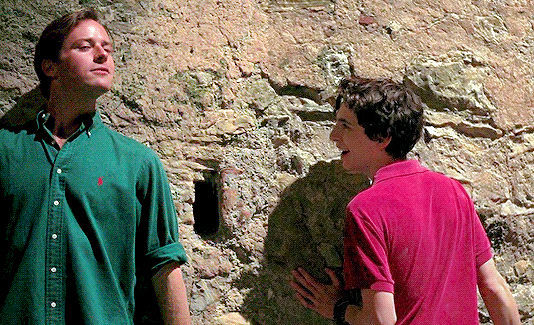
Chapter 1
The revelry from the bookstore leaves a heady buzz of la libertà flowing through their veins, and as the crescent moon climbs higher in a pin-pricked sky, Rome’s labyrinthine streets bear witness to the loss of their remaining inhibitions. Drunken kisses give way to drunken dancing - and unfortunate drunken vomiting - but the ancient cobbles are their compass on this ferragosto evening, steering them back to the complicit safety of their hotel.
The stale scent of sex still lingers in the room, yet tempted as they are to add to it, the prospect of their imminent separation is a sobering force. Elio’s body is heavy with exhaustion. The oppressive tightness in his chest magnified by all that he’s trying to ignore. Their time is borrowed. Soon, all of this will be naught but memory. The man beside him nothing but a ghost. Haunting his every step with visions of a life denied. A future obfuscated by what-ifs and maybes.
He refuses to sleep, however. Refuses to sacrifice a single minute to unconsciousness in spite of the grappa’s siren call. Absurd though it is, a part of him dreads waking up alone. That Oliver will disappear like a thief in the night - taking what’s left of his shattered heart with him. His guards are down - all his pretences stripped away - but here they are, stretched out on a too-small bed, solemn fingers caressing familiar skin. Worshipping each other by words, if not by the flesh.
And it isn’t easy. Of course it isn’t. Elio’s an individuo reservato. A trait he’s uncomfortably aware of. But he can’t let that stop him from spilling his innermost thoughts. From divulging the things he wishes he’d done differently. Or not at all. In some aspects, he’s sure he’s repeating himself, but there’s just so much he needs Oliver to hear. Things he never dared tell him previously - never deemed vital - when the end of their summer idyll was a nebulous concept.
Like how he’d leave the adjoining door open at night, hoping beyond hope that Oliver would walk through it. Or that afternoon at the tennis courts, when he’d recoiled from his massage for fear of leaning into the frisson of excitement. Needs him to understand his visceral reaction the morning after they first slept together. The crippling anxiety that twisted his intentions, necessitating a hasty - if short-lived - retreat. Wants to beg him not to forget. To remember everything. So that when next he tastes the salt-tang of the ocean upon his lips, the sweetness of apricot juice beneath a cloudless yonder, a piece of Elio - nevermind how fleeting - will slip into that parallel life, too.
All his secrets.
All his worries.
All he’s put off for later.
A futile notion, admittedly, now that there is no later.
No more chance for postponement.
Thankfully, he isn’t the only one speaking, and Oliver lays his own regrets out like a hand of cards whenever he stumbles into a tongue-tied silence. His forearm is slung around his waist, their legs tangled at the knees, and Elio drowns in his eyes as he recalls the steely glares that once pierced him to the core, but which he now appreciates were a means of self-defence. An attempt to stave off the unavoidable.
“Did you mean it?” he whispers, twisting Oliver’s Star of David between his fingertips as he burrows into the sticky warmth of his neck. “When you said you’d been happy here?”
“How can you even ask me that?”
“How can I not?” Elio replies, failing to control the tremor in his voice. “You tried to keep your distance when you arrived. It was me who sought you out. If I hadn’t pushed so hard -”
“I’d have probably spent ten more days kicking myself for my cowardice,” Oliver tells him, dropping kisses to his knuckles as though they’re something to be cherished. “Wearing holes in my espadrilles… trying to hide a semi each time you passed by in those swim trunks...”
Elio snorts. “The feeling’s mutual, mon ami.”
“So we’re both idiots, then?”
“Well… one of us was being purposefully difficult...”
“Goose,” Oliver growls, and Elio giggles despite himself when he’s tickled without mercy. “I’ll show you purposefully difficult.”
It soon devolves into a childish wrestling match, Elio’s wrists pinned above him as Oliver scrabbles along his sides, leaving him bow-taut and winded. “Tutto apposto! Enough!”
“You give?”
“I give,” he says, lungs heaving in his chest. “Dio… I shouldn’t have asked.”
“Nonsense.” Oliver rolls to the side, tipping his chin up to better meet his eyes. ”This is new to us both. It’s only natural to have doubts.”
Elio huffs. “Doubt is the father of inventions.”
“And may I ask what you’re inventing?”
An awkward shrug. “Nothing,” Elio says, afraid his misgivings will lead them down a destructive path. “And everything. You know how my brain works.”
“I do, yes.” Oliver brushes a thumb over his bottom lip. “Though for my sins, I’ve yet to find cause for complaint.”
“Déviant.”
“Takes one to know one.”
Elio nips at the tormenting digit, not quite ready to let the subject go. “I want to hear it,” he murmurs, teeth scraping the nail. “I think I need to hear it.”
“Elio…”
“Just tell me,” he insists, and sighing, Oliver pinches the bridge of his nose.
“It’s complicated.”
“Isn’t it always?”
Impatience flares at the return of his evasiveness, and the remorse in Oliver’s gaze is immediate. “We never talked much about my family, did we?” he asks, and Elio shakes his head, shuffling closer as Oliver draws a shuddering breath. “My parents, they’re.... well. To describe them as traditional would be a kindness,” he continues. “Our relationship has been strained for years, but they have certain... expectations, I suppose. For my future, specifically. You know how it is.”
“Do I?” Elio asks, stiffening as I'm sure I'll pay for it somehow echoed from the not so distant past.
The implication is clear, and maybe there are razor blades in his expression, because Oliver’s own turns instantly apologetic. “I guess not,” he says, sliding a conciliatory hand to his hip. “Do you have any idea how lucky you are?”
Elio frowns. “In what way?”
“With your folks,” Oliver explains. “My father would cart me off to a correctional facility.” A beat. “He still might.”
“Only if he finds out,” his traitorous mouth blurts before his alleged genius can catch up, and Elio’s heart sinks. “But he won’t, will he?”
It’s less a question, more a statement, and Oliver’s jaw clenches as he stares at him in silent concession. “I wish things could be different.”
“I know,” Elio says, the words braver than the sentiment behind them. “Me too.”
But the universe isn’t that lenient. Like Icarus, they’ve flown too near to the sun, and the consequences of such defiance will see their wings clipped once they crash back down to earth. He’d cautioned himself on the journey south to prepare for the blow. Peered out the grimy window of the direttissimo, knowing that when he next stands on the platform he’ll be alone. That he’ll hate it. Those rehearsals, it seems, have done little to dull the pain of what’s to come, and latent superstition has left him fumbling in the dark, regardless.
“E’ la vita,” Elio says, resorting to self-preservation as he dredges up a smile - the over-bright, false one he’s perfected through years of dinner drudgery. “Why risk it all for a bit of fun, right?”
“Don’t do that.” Apparently Elio’s not the only one who can see through a facade. “You mean more to me than some fling, and you know it.”
“But -”
“No. Hear me out.” Earnest, Oliver smooths the hair from Elio’s temple. “These past six weeks… I don’t know how to describe how important they were to me. The freedom. The acceptance.” His throat bobs in the grey strokes of dawn. “You.”
“Me?”
“Us.” Oliver fidgets with a loose thread on Elio’s shirt. “I meant it,” he mutters at last, winding an errant curl around the index finger of his other hand. “I have been happy here. I’ve been happy with you.” He hesitates. A quick flash of indecision. “I’m not sure I was ever really happy before you.”
“Please don’t say that.”
“It’s the truth.”
“Per carità! That only makes it worse,” Elio says, whirling away to hide in Oliver’s collar. The sour musk of sweat is soaked into the material, and he inhales deeply, hoarding every piece of him while he still can. “You are the very best parts of me,” he confesses, lifting his head. “I don’t know what I’ll do when -”
“Hey…” Oliver’s grip tightens. “Didn’t we go over this? You’ll be -”
“Fine. You said.”
“Clearly it bears repeating.”
Elio touches his face. Watches the ripples of emotion spread out like a pebble cast into the lake. “And you?” he returns, recollecting that night on the rock. His naivety in presuming Oliver’s ghost wouldn’t always be staring out at the horizon. Rodin’s Thinker clad in billowy cotton. “You’ll be okay?”
A breath. “I’ll be okay.”
Elio’s not sure which of them he’s trying to convince, so he kisses him gently in lieu of examining it further, his stomach flipping when Oliver pulls back with an air of exquisite softness. “What time do we need to be at the airport?” he asks, seeking sanctuary in distraction. “You have your passport, sì?”
“I do,” Oliver says, studying him carefully. “The plane leaves at noon. But don’t feel you have to -” He stops. Swallows. Tries again. “You don’t have to see me off. Not if you don’t want -”
“I want.”
“Elio -”
“Non essere ridicolo. I’m coming,” he tells him, fighting a shiver as the cool breeze from the window brings goosebumps to his skin. “Of course I’m coming.”
The relentless tick of the clock rings loud in the sudden silence, and Elio raises up on his elbow, only for Oliver to cup his cheek before he can turn towards the wall.
“Don’t look,” he whispers, sounding choked as he double checks the time on his watch. “It’s ten minutes fast at any rate.”
“Ten minutes?” Elio laughs. Slightly unhinged. “What difference does that make? Ten? Twenty? You still have to leave.”
He detests the unspoken word that hovers between them. The entire phrase a sullen admission of weakness: you still have to leave me.
“Don’t think of it like that,” Oliver murmurs, one hand stroking the base of his spine. ”We have a few hours yet.”
Elio sniffs. “Not like they’ll matter tomorrow.”
“Maybe not. But they matter right now.” Oliver nudges their foreheads together. “Every second, Elio.”
“Every second, Elio,” he echoes numbly, if only to call him by his name one last time.
He’s shaking, he realises, though in all honesty he doesn’t care that his vulnerabilities are on display. That Oliver can see how lost in him he really is. That the situation is gutting him, and he’s unable to stop the bleeding. His chest feels concave. The space below his ribs too small to contain the sheer need and protectiveness that washes through him. He wants to shelter Oliver from the storm that lies ahead. To house him beneath his breast where the burdens of this world cannot touch him. Encapsulate everything Oliver is within the confines of himself, meagre as those confines might be.
But what can he do? Implore him to stay? Ask him to give up his doctorate? His career? His responsibilities? And for what? A life in the shadows? Always looking over their shoulders. Always that sense of shame.
He thinks of the pink and yellow lilies that bloom in the giardino back in B. The delicate petals that unfurl for such a brief period of time. There’s something recherché, he knows, in such transitory beauty, yet Elio’s never lacked for stubbornness. Oliver may believe his story is already written - that their destiny is forged in stone - but no one’s ever survived a freefall by continuing to spiral.
For something so tragically temporary, their bond has left a permanent mark. And Elio? He wants to beat his fists against this odious ending until they’re bloodied and raw.
35 notes
·
View notes
Text
Close to Me: How the Hollow Knight's Fighting Style Reflects Their Trauma (and the Radiance's as well)
So I've been trying to actually beat the Radiance, which means I've been fighting the Hollow Knight. A lot, as a matter of fact, since I'm beans at this game sometimes. I've also been thinking about @lost-kinn's meta about how fighting styles are how Vessels, especially the Little Knight, communicate.
In trying to apply this to the Hollow Knight, I've been coming to some very interesting conclusions, especially taken in context of...Everything Else in the lore, and Everything Else implicated in this by the psychology of it.
There's a lot to cover here, and it tracks through a LOT of different places, including trauma psychology, the relationship between chronic stress and lifespan health, and shape symbolism. Two warnings first:
One: this essay is gonna get heavy. It includes fine-grained discussion of the Hollow Knight's trauma, including discussions of the real-life machanics of psychological abuse, as well as the Extremely Concerning Implications of them harming themself during their boss fight. please read with caution and when you're in a safe emotional place to do so.
Two: This post is not a place for justifying the Pale King. If you read this essay in its entirety and still want to do that, please make your own post; my relationship to the Hollow Knight themself is deeply rooted in my own experiences, so in the context of this discussion I can't promise I won't take it personally.
With that out of the way, let's talk trauma and fighting styles:
We know that the Hollow Knight is trained to be a paragon of fighting skill, through the Pure Vessel fight, and this gives us a fantastic way to compare what they were like before they were made Government Assigned Radiance Jail, and after. Or, in other words, we're given the perfect opportunity to see what the Radiance is doing (i.e. context effects), and what Hollow is (i.e. what we can conclude is reliably consistent as a part of them). Listed here, for reference:
Hollow's attacks:
Three slashes
A dash slash
A Radiant Shade Soul, which launches a volley of Infection blobs in arcs
A Radiant Desolate Dive, which produces pillars of entwined Void and Light at random intervals
The Infection bursting out of them in random arcs, covering a significant amount of the aerial space of the arena
The Radiance ragdolling their body around trying to hit the Knight
Contact damage from them stabbing themself and falling over atop you
The Pure Vessel's attacks:
Three slashes
A dash slash
A Pure Shade Soul, which launches a volley of nails in straight lines
A Pure Desolate Dive, which produces nails at specific intervals
A Pure Focus, which causes circular explosions across most of the aerial space in the arena
Lashing out with a Void Arm (word choice intentional)
I've highlighted attacks from each battle that are different, since those are our points of interest here. In addition, both the Pure Vessel and Hollow are exceedingly fond of teleport-spamming in a way that is usually reserved for a specific group of bosses.
Another very important distinction between these two fights: the Pure Vessel doesn't scream. Well, they certainly try to, but no sound comes out. No voice to cry suffering, after all. All of these points have a lot to go into, so let's address them one at a time.
All That Remains: Theoretical Background On The Significance Of Constants
Making comparisons across time is important specifically because humans (and human-like bugs) change. Most personality traits aren't set in stone--they exist as an interaction of someone's internal tendencies, their experiences, and their environment. Speaking of those last two points, not all experiences and environments are created equally. Adverse childhood experiences (ACEs for short) are known to have lifelong implications for a child's health, both physically and mentally. These are events that are so stressful or stressful for so long that they exceed a child's ability to cope and become toxic stress (yes, that's the term in the literature, because it actively damages your organs). They compound, as well--the stress of one ACE makes it harder for a child to cope with another, especially if they overlap.
Some examples of ACEs? Being exposed to physical danger or the threat of physical danger, deprivation of normal social relationships with peers of a similar age, being forcibly seperated from family members, witnessing a loved one being hurt or killed, chronic illness in oneself or a family member, neglect of a child's emotional needs....
Poor fucking Holly. It's a miracle they didn't disintegrate under the pressure. The only other option is that they bent and adapted under that much stress--in other words, most of their personality has been forcibly reshaped by what they've gone through. Anyone who has up-close experience with parentification or complex child abuse already knows: this was by design. I'm not saying the intent was to traumatize the Pure Vessel past several points of no return, but the intent definitely was to reshape their personality for the purpose of being The Vessel. We only see them (the Pure Vessel) in battle after this process is mostly or entirely complete, but we do see them a few times beforehand. I'd like to draw attention to the Path of Pain cutscene right now.
I've seen people talking about the look the Vessel and the King share as a sign that TPK really does love his child. That might be true, but it's definitely not relevant when it comes to how abuse works. This is, in fact, exactly how the cycle of abuse uses affection as a tool. Long periods of abuse or neglect, smoothed over by small periods of affection that placate the survivor? That's textbook love bombing, the kind that forms stubborn trauma bonds and facilitates unhealthy dependency. Forgive me for not giving the Higher Being of knowledge and prescience the benefit of the doubt on that one. (/s)
Team Cherry knows about the importance of parallels and dissonance. There's a reason the music in the second phase of the Hollow Knight fight plays in the Path of Pain. There's a reason it cuts out the moment the battle with the Kingsmoulds is over, instead of at the room transition. There's a reason it doesn't cut out in the Black Egg. Actually, there's two potential reasons, which could also coexist: either little Hollow trusts the Pale King to keep them safe, even after the borderline torture that they were just subjected to, or big Hollow is so hypervigilant that they're in full functioning-through-trauma mode even while they're at death's door.
If you don't see how much the Pale King scarred his child at this point, I'm not sure we were playing the same game.
Walking the Straight Line: How the Pale King's Teachings Show In the Pure Vessel
The Pale King loves order and control. Everything about the White Palace and every decision we see him make implies this. Everything is spotless white walls and well-maintained gardens; the only signs of disorder are hidden away, either in his workshop or in The Pit™. This also reflects in the Pure Vessel's title--pure as in holy, but also pure as in without flaw. Considering the Nailsmith's emotional state after completing the Pure Nail, TPK's fate with his Perfect Controlled Kingdom, and the Godmaster ending as a whole, attaining perfection is not a good thing in any sense.
We know the Hollow Knight isn't perfect--that's the whole catalyst for the plot. But considering their upbringing and their fighting style as the Pure Vessel, their imperfections absolutely kill them emotionally. I'll spare the lecture on how perfectionism affects neurodivergent kids even more severely than neurotypical kids, if only to keep this post to a reasonable length (look up "twice-exceptional children" if you'd like to know the theory I'm glossing over in more depth). But, in essence, the deck is doubly stacked against them--they have a higher goal to reach, and far more obsctacles in their path, including their own emotional scars.
I've already discussed how Hollow isn't meant for this kind of stress in a physical sense in other posts. They're not prepared for it emotionally, either--the Pale King wants perfection, and they can't even stand up straight (every spoonie in the audience already knows how exhausting people's obsession with Standing Up Straight is). There's another page on their stack of emotional baggage, even BEFORE you consider that the Pure Vessel knows their perfection is what bought them a ticket out of the Abyss.
Bringing Teleportation To A Sword Fight: Where The Pure Vessel Reveals Their Fears
How else are they going to cope with that need for perfection, that need to prove themselves worthy of the reason their life was spared, by being flawless in any way they can? Being a mechanical, flawless fighter puts so much pressure on them, both literally (repetitive strain injuries fucking HURT) and figuratively--if you're predictable, the only sure way to win is to mop the floor with your opponents before they figure you out. Hell, that's the way most people play their first run of Hollow Knight, by throwing themselves at the bosses over and over until they figure out the patterns. That strategy is inherently going to fail against an opponent that's, say, an immortal higher being.
There's no way that the Vessel didn't figure this out, and yet none of their TPV specific attacks are positioned randomly--the nails are always evenly spaced, and the Focus explosions are always in a specific height region of the screen. That's clinging to survival strategies even when they become maladaptive in its purest form.
Another dip into psychological theory: let's talk about disorganized attachment. Attachment styles describe how someone's relationships to their main caregiver(s) influence their understanding on relationships in general. Disorganized attachment is a result of an upbringing of inherently unstable parent-child relationships, where there's no way of a child predicting whether an adult is going to be delighted to see them, ambivalent, upset, or otherwise. If my parent woke up some days saying "all right my child, time for the Infinite Buzzsaws Obstacle Course," I'd be the same way. In adulthood this manifests as an inability to form a stable sense of self-concept as well as concepts of others. Mission accomplished, TPK, there's no will to break if you broke it yourself.
This is where the fighting styles as communication comes in--Hollow needs to keep Ghost at a distance to fight, but also wants to be closer to their sibling (the only being who has a chance of understanding what they've been through), BUT also has a trauma-rooted fear of attaching to people, as their experiences with attachment are inherently unpredictable and dangerous. Hence, both the teleportation that doesn't seem to match their fighting style any more reliably than "aim at the thing attacking you" and the second attack unique to the Pure Vessel--they're quite literally lashing out in pain to push people away. There's a reason that attack is so reminiscent of the Thorns of Agony.
Of note is that Holly does seem to teleport like the bugs of the Soul Sanctum do (favoring the edges of a screen, rather than going wherever like Dream Warriors do), which makes sense--they're the most obvious answer to the question "how did they learn how to teleport, anyways?" However, Sanctum bugs have abilities designed to capitalize on this, like homing spells and slashes from above. I can only assume this means that someone saw Holly's proficiency with the nail and assumed it translated to other forms of combat, and didn't feel the need to give them at least a bit of a primer on how to make the best use of it. There's another tally for the Hollow Knight as an autism metaphor.
Trauma Bonds: How the Radiance Speaks Through Hollow
Now, we're back to the Black Egg, and two people stuck in the same sinking ship. The thing that makes this hurt so badly is that Holly and the Radiance are at complete cross purposes here, and yet they both want the same thing:
They both want out, no matter the cost. For the Radiance, this means forsaking the pacifistic nature of the moths and nuking Ghost personally.
For Hollow, this means forsaking the way they were raised and everything that was bludgeoned into their personality: the only way out is to fail, give up control, and trust that Ghost will do what needs to be done.
Imagine how much pain they're in to actually go for it. Going against a literal lifetime of conditioning is something that takes the average person years to even consider, let alone go through with. It's a form of learned helplessness--if you try to break free and fall, again and again, it actively discourages further attempts. Breaking through learned helplessness is an interesting process, because it generally involves re-establishing a sense of control by recalling previous events where the person was able to change their situation.
Which, as far as we know of, are nothing but traumatic memories for Hollow. It's very unlikely that they'd break through it on their own, but we know they have by the time we see the second phase of their fight. This is them at their most desperate: the same music as the Path of Pain, the way they let, or can't stop, the Radiance throw their body around, the way they actively try to let the Radiance out by stabbing themself.
You'd think that giving up and learned helplessness are inherently compatible, but when giving up both goes against your core personality, and involves your active participation, they're in direct opposition. So either Holly was able to process all their trauma by themself (which I doubt, judging by how much effort the player has to go through to even see Ghost's and Hollow's traumatic memories), or someone gave them a nudge or three in that direction.
Considering that there's been someone living in Holly's head who has a vested interest in them Not Doing Their Duty, I think we know who. And the thing is, I think we watch Hollow have this breakthrough during their battle. Imagine for the first time in decades, at least, you can move. You're in pain from being in the same position, probably hallucinating from sensory deprivation, with an infection sucking at what strength your body has left. And there's this little creature who looks ready to fight you, who seems to have let you go for that exact purpose.
And you look down, and both you and the Radiance recognize them from a place rooted deeper than consciousness, in the murky depths of trauma. You see the other Vessel who just as easily could have been you, and who looks so much stronger for not being you, for being an imperfect, willful creature. And the Radiance sees history threatening to repeat itself, another one of the Wyrm's cursed children seeking to lock her away once more.
What else do you do when you're triggered? You scream, and you go on instinct, and you retreat into your head. Those first blows, with the epic music? That's the Vessel the Pale King forged, the fighting machine that will endure unimaginable stress because it knows no other way. What snaps you back out of dissociation? Usually, either the passage of the triggering stimulus, or an even more relevant stimulus (severe pain from getting beaten up by a nail, for example).
The tragedy is this: we know this isn't a triumph. I think most of us went into that fight the first time, knowing we'd be putting the Hollow Knight out of their misery. The music turns tragic, Hollow screams, and then we see the Radiance and Hollow themself break through: the Radiance trying to fight Ghost directly with the resources she has, and Hollow trying to help her along.
For what it's worth, Hollow even had the right idea, when it came to letting themself rest while helping Ghost stop the madness their father started--they were just digging for the Radiance in the wrong place. The dynamic between the Radiance and the Hollow Knight is something I could write on for pages and pages, but this has gone on for long enough. Tune in next time, where I'll presumably talk about this same topic but in reverse with regards to the Radiance.
#hollow knight#hk#the pure vessel#the pale king#the radiance#my meta#the higher being speaks#i hate fact-checking my abuse infodumps because the ableism against personality disorders is EVERYWHERE#but here this monster of an essay is#anyways the hollow knight as a character sniped my trauma on sight#so i may be a tiny bit biased here But Also I'm Right#abuse //#child abuse //#emotional abuse //#i legit do not know what tags to throw on this#also the overarching title is a reference to the song of the same name from just shapes and beats because. yeah
316 notes
·
View notes
Note
Are the second generation really meant to mirror the first? I'm helping my sister revise for her end of unit test on it and it's mentioned quiet a bit in her notes but from what I've read (though tbf though- I'm reading certain parts for revision) I'm not really getting the vibe of that tbh. Can you help me understand why people may think this. Thank you.
Disclaimer: I'm certainly not an expert on the book and the criticisms about it - I read about it purely for my own enjoyment and there are many interpretations I’m probably not aware of.
First, I would say they aren’t exact replicas or mirrors but are more like echos or perhaps extensions of the first generation. Certainly all the baggage of the previous generation is placed on them. Catherine Linton and Hareton Earnshaw are much easier to connect to the first generation then Linton is, in my opinion, but some critics have tried to do so - mostly in asserting that there is a love triangle between them similar to Heathcliff/Catherine/Edgar. There are a number of connections that critics make between Hareton/Cathy and Heathcliff/Catherine and some have been told a million times but I’ll try to cover the ones I remember. Let me see if I can keep this organized and not get too off topic.
The similarity of their characters: At first glance you have the repetition of names - “C” and “H” appear repeatedly. Most apparent is that Catherine Linton is named for her mother. Hareton, although obviously an old family name since its been carved above the threshold of the Heights, it does feel intentional in furthering the connection between “C” and “H.” I’ve always found it interesting we have this scene from Cathy II and Linton in Chapter 14, that seems to directly call out the C & H connection:
“We found two in a cupboard, among a heap of old toys, tops, and hoops, and battledores and shuttlecocks. One was marked C., and the other H.; I wished to have the C., because that stood for Catherine, and the H. might be for Heathcliff, his name; but the bran came out of H., and Linton didn’t like it.”
Funnily I don’t think the H is for Heathcliff, I think its more likely meant for Hindley, but of course Heathcliff has been semi-assimilated into the Earnshaw family by being given the name Heathcliff, which was the name of a deceased child. To me at least, none of these feel unintentional, it feels fated since we have these repetitions noted by the characters themselves.
Cathy doesn’t only share a name with her mother, she lives in her shadow. We know from Nelly that, “On the anniversary of her birth we never manifested any signs of rejoicing, because it was also the anniversary of my late mistress’s death.” Edgar seems to cherish her in part because she is a remnant of her mother, even displaying many similar characteristics, although Nelly is quick to note Cathy is softer and more genteel - which makes sense considering she grows up with a loving father in a calm environment that lets her do as she pleases. She doesn't grow up with the harshness of the Earnshaw family, and Joseph's ranting, and it also seems that Nelly may have softened and become more maternal as years have gone by. I’d say she does become more and more like her mother after living at Wuthering Heights though.
Some really great parallels between the two Catherine’s dialog have been made by Ann Dobyns - I’ve posted a few excerpts from her essay here if anyone is interested, it’s a bit more in-depth than this needs to be though.
Hareton has many parallels to Heathcliff as well - this is intentionally done by Heathcliff who, upon Hindley’s death, speaking of his plotting says, “And we’ll see if one tree won’t grow as crooked as another, with the same wind to twist it!” Heathcliff and Hareton have such an odd fated destiny, from the moment Heathcliff saves his life by catching him as his father dropped him over the bannister of second floor. Hareton from the start fears his natural father, “squalling and kicking in his father’s arms,” Nelly even fears Hindley will “frighten the child into fits.” Worlds different the description of a scene of very typical father/son affection described by Nelly during Hindley’s funeral when she says little Hareton, “played with Heathcliff’s whiskers, and stroked his cheek.” Or earlier when she had asked Hareton if he liked Heathcliff and he says:
“Ay!” he answered again. Desiring to have his reasons for liking him, I could only gather the sentences—“I known’t: he pays dad back what he gies to me—he curses daddy for cursing me.
In Hareton’s mind Heathcliff is more a protector than his father, and I suppose in many ways he is better than Hindley’s random obscene violence. As wrong as it is that Heathcliff denies Hareton his inheritance and an education, I think it does say something (not entirely sure what) that he is never physically abusive to Hareton in the way Hindley was with him. Hareton doesn’t ever show any real fear of Heathcliff.
Heathcliff has his own complex feelings towards Hareton, definitely preferring him to his own son - he tells Nelly, “Do you know that, twenty times a day, I covet Hareton, with all his degradation? I’d have loved the lad had he been some one else.” So it seems we have the daughter of Catherine and the wished for son of Heathcliff. Lockwood even mistakes Hareton to be Heathcliff’s son momentarily in Chapter 2.
Some other parallels - Heathcliff notes the similarities between them later on in a discussion with Nelly:
“He’ll not venture a single syllable all the time! Nelly, you recollect me at his age—nay, some years younger. Did I ever look so stupid: so ‘gaumless,’ as Joseph calls it?”
“Worse,” I replied, “because more sullen with it.”
On other occasions Nelly talks about how Heathcliff liked to induce horror from those around him and “he contrived to convey an impression of inward and outward repulsiveness.” Hareton behaves similarly - in one scene after being taunted by Linton and Cathy, he throws Linton from the room to the disgust and fear of Cathy in Chapter 23:
...Earnshaw burst the door open: having gathered venom with reflection. He advanced direct to us, seized Linton by the arm, and swung him off the seat.
“‘Get to thy own room!’ he said, in a voice almost inarticulate with passion; and his face looked swelled and furious. ‘Take her there if she comes to see thee: thou shalln’t keep me out of this. Begone wi’ ye both!’
“He swore at us, and left Linton no time to answer, nearly throwing him into the kitchen; and he clenched his fist as I followed, seemingly longing to knock me down. I was afraid for a moment, and I let one volume fall; he kicked it after me, and shut us out.”
Similarly, when sitting next to him, Lockwood says, “My neighbour struck me as bordering on repulsive.” Even Nelly, who I’d say is typically biased towards Hareton, upon seeing him says he “seemed as awkward and rough as ever.” Lockwood also describes him as being “almost haughty,” similar to Nelly’s repeated references to Heathcliff’s ego and “proud heart.”
Heathcliff further casts light on their parallels when he says he sees Hareton as the “personification of my youth,” adding that, “Hareton's aspect was the ghost of my immortal love, of my wild endeavours to hold my right, my degradation, my pride, my happiness, and my anguish.”
The love triangle: I know some critics have said the dynamic between the Linton/Catherine/Hareton is similar to Edgar/Catherine/Heathcliff - I don't particularly see this. Cathy II is forced into marriage with Linton and at that point doesn't have notable feelings towards Hareton, compared to her mother who knows she loves Heathcliff more and still does have a choice to make even if it isn’t an easy one.
Still, there are similarities in their relationship in that both men (Heathcliff and Hareton) end up feeling the need to better themselves because for their respective Catherine. Nelly says of Hareton, “He had been content with daily labour and rough animal enjoyments, till Catherine crossed his path. Shame at her scorn, and hope of her approval were his first prompters to higher pursuits.” I think this is similar to Heathcliff deciding to run away after years of abuse and to risk everything, including his life, after hearing Catherine says it would “degrade” her to marry him. Hareton does seem to show some jealously over Cathy’s attention and regard of Linton, and again with the presence of Lockwood so I suppose it is sort of love triangle-y?
I also think Hareton shows signs of a growing devotion, similar to what Heathcliff felt towards Catherine. He certainly seems to be enamored by Cathy from the very first time they meet - Nelly says he, “stared at her with considerable curiosity and astonishment” and was, “too awkward to speak; though he looked as if he did not relish my intrusion.”
Something I’ve mentioned before is that Lockwood says about Hareton and Cathy, “Together, they would brave Satan and all his legions,” which feels like a direct parallel to Heathcliff’s assertion to Catherine that, “misery and degradation, and death, and nothing that God or Satan could inflict would have parted us.”
Also Heathcliff seemingly attempts to play the role Hindley played in his youth when he tells Cathy, “Your love will make him an outcast and a beggar.” It seems both Catherine and Heathcliff knew their love would result in the same situation as Catherine relays this to Nelly when she says, “did it never strike you that if Heathcliff and I married, we should be beggars?”
There is also, of course, the similarity of social stature - when Cathy first meets Hareton, he has nothing to his name and lives almost as a servant at Wuthering Heights, similar to Heathcliff’s position while Hindley was master. Cathy, similar to her mother, is better educated and has more opportunities - there is no socially accepted reason that she would choose Hareton, seeing as he can’t give her money, status, or respectability.
The circle of events and “The Butterfly:” It does feel, in my opinion at least, that it is no accident that our happy ending is the union of Hareton and Cathy. It couldn’t happen with just any couple or in any other way. It does feel that they are made into the semi-proteges of Heathcliff and Catherine, and the elements of the Linton’s allows for there to be peace between the two families. There is a kind of resolution and unification of their energies.
This is probably the most common narrative of the connection between Hareton/Cathy and Heathcliff/Catherine, and that is rather than just a parallel, critics have noted that the story of Catherine comes full circle with their marriage. The first Catherine wrote out her possible futures on her window sill in the names: Catherine Earnshaw, Catherine Heathcliff and Catherine Linton. Her daughter ends up reversing these different identities being born a Linton, marrying a Heathcliff, and finally an Earnshaw. That can’t be merely a coincidence.
Critic Dorothy Van Ghent deemed Catherine and Heathcliff the “original two” and she said that with the civilizing of Cathy and Hareton, "the great magic, the wild power, of the original two has been lost.” Others say that while poetically it makes sense within the repetition, Catherine and Hareton’s relationship is “improbable” but I disagree. I really liked Carol Ramsden’s take on this that incorporates Emily’s essay “The Butterfly,” and makes the parallel between the 1st and 2nd generation - I have posted this before but to save myself the time of rephrasing it I’ll just post the quote:
In Wuthering Heights, we encounter a destructive principle at work in the love between Catherine and Heathcliff. The principle is manifested fully in Catherine’s mental collapse and Heathcliff’s vindictiveness. However, the love between Cathy and Hareton is allowed to flower and they are both, in their own ways, products of the first lovers. The principle of destruction, as in “The Butterfly”, is transformed into a creative energy. Ultimately, Catherine and Heathcliff are also not deprived of this creative energy. Instead of representing a pessimistic view of life, their love, too, comes to suggest that all things work together towards good.
I think that’s an interesting take, besides just a happy ending for Hareton and Cathy it almost feels like a happy ending for Catherine and Heathcliff? In some ways they burned up only to transform into something better. Not saying that is how it is meant to be read, but I do like it (probably because I like a happy ending).
I feel like there are other points that I’ve forgotten? But these are what I remember at least.
#sorry you asked what should be a simple question and got a novel back hah#wuthering heights#hareton earnshaw#i really hope this made sense and was what you were asking about#tw abuse#catherine linton#linton heathcliff#thoughts
44 notes
·
View notes
Text
Podcasting "Self Publishing"

This week on my podcast, I read my latest Medium column, “Self-Publishing,” an essay about the structural shifts in the publishing industry over the past half-century and how and why that has driven people to try self-publishing.
https://doctorow.medium.com/self-publishing-41800468bcfe
The tale starts with the rise of Big Box stores, after Reagan’s deregulation got Sam Walton to take Walmart national. This concentrated the “mass market” — the huge, variegated world of pharmacy and grocery and cornerstore spinner racks that were the cradle of genre fiction.
The big boxes demanded a single national distribution system, and hundreds of local distributors — whose unionized Teamsters stocked the spinner racks based on long territorial experience — collapsed to a handful of database-driven decision-makers.
The number of titles for sale fell off a cliff. Writers who had a single underperforming book were no longer welcome in the big boxes and thus no longer economically viable (remember all those established writers who switched to pen-names? They were trying to beat this).
Monopoly begets monopoly. The predatory discounting of the big box stores put the squeeze on chain bookstores and indies. The chains merged and merged into a duopoly, while the indies underwent a mass die-off.
Publishers were caught in this squeeze: the two national bookstore chains and the big box stores demanded extra co-op payments, preferential discounts, and more generous credit and return policies. The publishers merged and merged, down to six (now four).
This also happened with trade distributors (who sold to bookstores, not the mass market) — the industry collapsed into a duopoly (today, it’s a monopoly, run by Ingram).
This is a familiar pattern across all monopolized industries.
As David Dayen described in MONOPOLIZED, this neatly parallels the monopolization of health care: pharma monopolized and gouged hospitals, who monopolized in self-defense and gouged insurers, who monopolized in self-defense.
https://pluralistic.net/2021/01/29/fractal-bullshit/#dayenu
Both monopolistic trends had the same end-point: after all the companies had finished monopolizing, the disorganized group of suppliers and workers were the only ones that the monopolies could strong-arm. In the case of hospitals, that’s health-workers and patients.
In publishing, it’s workers and writers. If you work in publishing and your resume is rejected by four companies, it has been rejected by every major publisher. If you’re a writer whose book is rejected by four publishers, then you’ve been rejected by every major house.
That’s why writers are now expected to give up graphic novel, audio, world English, and other valuable rights for the same advances — with fewer companies bidding on books, the likelihood that one will pay more or demand less goes down.
In the 2000s and early 2010s, some writers hoped that they’d be able to sidestep publishing by allying themselves with a different monopolized industry, locking themselves to Amazon’s platform. But as competition from publishers dwindled, so too did Amazon’s largesse.
The authors who shackled themselves to Amazon now face tens of millions of dollars in wage-theft. The solution to unfair treatment at the hands of giants isn’t to ally yourself with an even bigger giant and hope for its ongoing generosity.
https://pluralistic.net/2020/11/03/somebody-will/#acx
A more promising sign is in the wave of mid-sized houses that have snapped up the workers shed by Big Publishing during mergers as well as the promising new publishing workers who are surplus to the Big Four’s needs.
These presses punch way above their weight, thanks in part to the number of great books that just don’t fit into the publishing needs of four giant houses. But as great as this is, it’s intrinsically precarious.
These mid-sized houses can’t stand up to the might of one distributor, one national bookseller, four big box stores, and one giant ecommerce monopoly. Earlier mass die-offs in indie publishing (like the American Marketing Services horror story) show how fragile this is.
Which brings us to self-publishing. There have never been more sophisticated tools for making polished, professional books on your own — Lulu.com, Smashwords, Bookbaby — and (thanks to layoffs) it’s never been easier to find publishing pros to help with that process.
But that’s not “publishing.” As Patrick Nielsen Hayden once told me (paraphrasing), “Publishing is identifying a work and an audience and doing whatever it takes bring the two together.” In other words, how do you convince people to give a shit about your book?
This is an incredibly hard problem. It’s the hard problem of advertising, religion and politics. There’s no established method for it because the attention wars are a race against adaptation — what worked yesterday won’t work today.
https://locusmag.com/2018/01/cory-doctorow-persuasion-adaptation-and-the-arms-race-for-your-attention/
If you want to self-publish, you need to observe books like yours, identify how they are discovered by their audiences, formulate a plan to do the same, execute the plan, measure your results, and change the plan and do it again, and again, and again.
Publishers don’t just have systems and experts — they also have multiple data-points, a stream of books where they get to try different things, refine their successful tactics, and try again. You have a data-set with one point in it: you.
It follows that if you’re not prepared to work as hard (and well) at marketing, sales and promotion as you did at writing, you probably shouldn’t self-publish. Doing those things won’t guarantee your success, but without them, failure is all but assured.
That said, the one area where self-publishers can sometimes outdo publishers is accessing (parts of) the mass-market. The vast majority people aren’t “readers” (in the sense of being people who regularly buy books, go to bookstores, etc).
Every mega-bestseller is just a book that succeeded with a tiny sliver of nonreaders. And you might know more about a community of nonreaders — a faith group, fandom, subculture or political movement — than anyone in publishing.
If that’s the case, and if you are both diligent and lucky, you might be able to successfully market you book to that group and even leverage that success into a publishing deal that brings your book to “readers” — whom a publisher knows more about than you ever will.
I published by first book in 2000. Since then, I’ve published a couple dozen more, everything from novels for adults to YA novels to a middle-grades graphic novel to a picture book to essay and short story collections to book-length nonfiction.
I’ve published many books, including multiple bestsellers, with one of the Big Four publishers, and I’ve also published with several mid-sized boutique presses (some of which have merged with bigger publishers since).
I’ve successfully self-published, including a $267,000, record-smashing Kickstarter campaign. I’m a recovering bookseller and I’m unhealthily drawn to great bookstores, which are doing surprisingly well (thanks partly to Libro.fm and Bookshop.org).
https://www.kickstarter.com/projects/doctorow/attack-surface-audiobook-for-the-third-little-brother-book
Despite all this, I’m keenly aware that runaway consolidation makes my position as a worker in this system intrinsically precarious. The wonderful people in big publishing love books and treat me very well, but they can’t fix the system.
I’ve met sincere, talented people at Amazon doing their best to support publishing, but they can’t fix the system either. Neither can James Daunt, a true hero of bookselling who has come to America to transform Barnes and Noble.
Monopoly begets monopoly. If any part of the supply chain is allowed to monopolize, the rest will follow in self-defense, and it will always be the workers — the writers and staff — who struggle to push back.
That’s why the current resurgence of both trade-unionism and antitrust are so important. In a world whose outcomes are more determined by power relationship than by good intentions, the only way to secure workers’ futures is to make them stronger and make business weaker.
The essay is here:
https://doctorow.medium.com/self-publishing-41800468bcfe
The podcast episode is here:
https://craphound.com/news/2021/07/05/self-publishing/
The MP3 is here (hosting courtesy of the Internet Archive, they’ll host your stuff for free, forever):
https://archive.org/download/Cory_Doctorow_Podcast_396/Cory_Doctorow_Podcast_396_-_Self_Publishing.mp3
And here’s my podcast feed:
http://feeds.feedburner.com/doctorow_podcast
24 notes
·
View notes
Note
Hey so I was wondering about Dick's Romanian heritage. Is it mentioned a lot in comics or media? Is he dark skinned in any adaptations? Is it true he originally went to Juvie after his parents died? Where would I go to find this stuff out? Thanks!
Sure! So, Dick’s heritage is a pretty complex topic. I think it’s best to leave the explanation to [this post]. Since I know not everyone will click the link, just to briefly clarify something: Dick is Romani, not Romanian. Being Romanian means being from the country of Romania. Romani people are scattered across the world. Also, Dick is typically depicted with light skin in canon...him being Romani would not conflict with this, because the Romani people have a large range of skin tones. Not at all opposed to him being depicted with darker skin, but just so that you know. Very, very strongly recommend checking out the post for the whole story (edit: and checking the reblogs for the counterpoint to said post!!)
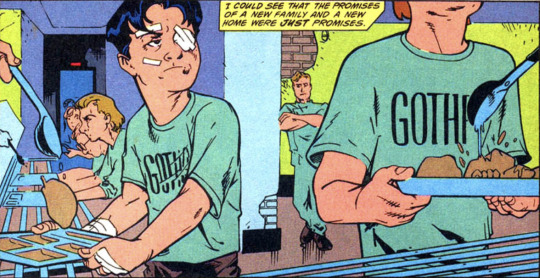
Robin (1993) Annual #4
As for your other question...in one version of Dick’s origin story, following his parents’ deaths, Dick was sent to Gotham’s Youth Center. This center was essentially a juvenile detention center; most of the kids were sent there for committing what are described in comic as “adult crimes.” It was a very rough environment for Dick, especially in the aftermath of his parents’ deaths.
Dick going to the center after his parents died is technically a retcon of his origin (ie it was something added later). I know for some reason certain people hear the word retcon and immediately are like “then it doesn’t count!!!” but I think that is very much the wrong approach. True enough, some retcons are bad--that is, those that completely ignore previously established characterizations or plot points, and in doing so often radically change the story for the worse. It’s fine if people want to ignore those bad retcons, I do so myself. But, that’s not true for every retcon lmao. I’d say the juvie origin retcon is a great example of a good retcon. It really helps to clarify and enhance the original story, and I don’t think it should be dismissed. Hear me out here:
1.) The juvie origin doesn’t replace any previous origin story--it really only adds to and improves upon the timeline of Dick’s original origin.
For the most part, in previous tellings of the story, Dick’s origin went pretty much straight from his parents dying to him and Bruce in Wayne Manor. It’s a pretty sudden, jarring jump; the in-between was largely left to the reader’s imaginations or implied to not exist at all. And I’ll be real...the pacing and immediacy of events is pretty wonky and unreasonable. In one of the most extreme speed runs through Dick’s origin I’ve seen, Dick’s parents die and Batman immediately swings down from the rafters and tells Dick that he’ll solve the case...while Dick’s parents’ bodies are still cooling a couple feet away (Batman #436). Yeah, that is absolutely ridiculous lmao, as is the idea that Bruce just immediately adopted Dick the day his parents died. I think that the juvie origin very nicely slows things down and helps to organically fill in the gap of time that would and should exist between Dick losing his parents and being taken in by Bruce.
2.) The juvie origin helps to rationalize Bruce’s reasoning for taking Dick in.
In previous origin stories, Bruce’s main motivation for taking Dick in is that he saw his own suffering reflected in Dick and wanted to help him. I dig the parallels between Bruce and Dick...but this is very flimsy reasoning to adopt someone lmao. With all the tragedy that occurs in Gotham, you cannot tell me that Bruce had not run across some orphans before. Bruce sympathizing with Dick certainly should be part of what motivates him, but there needed to be something more. If there is not some immediate, urgent reason to adopt Dick, then it makes zero sense that Bruce would try to raise him honestly. Why would Bruce tear Dick away from his remaining family and friends at the circus? Why would Dick want to leave? And even if Dick could no longer remain at the circus, why wouldn’t Bruce allow Dick to go to a good foster home, especially since Bruce is so laser focused on his solo crusade against Gotham’s crime that he doesn’t even allow himself to have a steady girlfriend half the time? Lots of plot holes here!
The juvie origin fixes a lot of these issues! Staying at the circus is not an option for Dick, not because Bruce just snatches him away, but because legally Gotham Juvenile Services says that the circus is an inadequate environment for raising a child. Dick is sent to juvie, and the comic makes a point of showing Dick nearly being beaten to death almost immediately upon arriving.
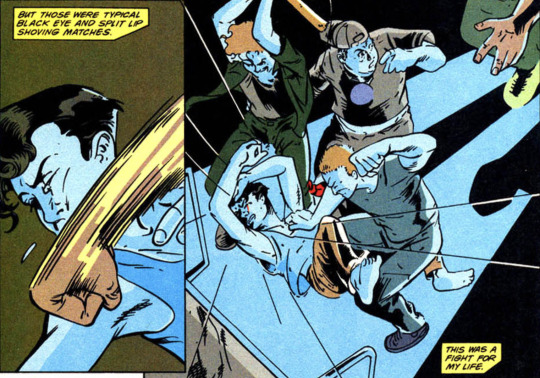
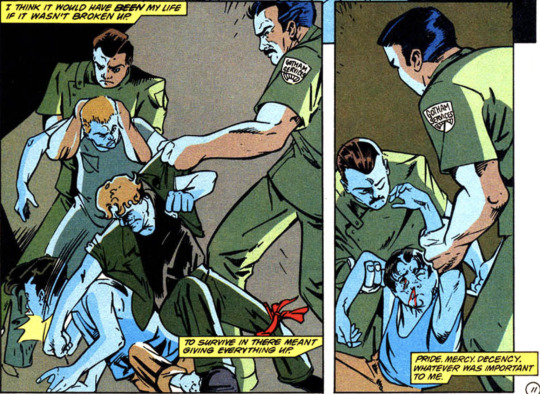
Dick is in danger and he’s lost in the system, so there is no longer a possibility for him to land in a good home. Initially, when Bruce goes to find Dick, he’s still tracking him down only with the intention of getting justice for Dick by solving his parent’s murder. But Bruce is a good person at heart. When Batman finds Dick trying to escape from the juvenile hall, beaten to hell, he intervenes. The next morning Dick is taken in by Bruce Wayne.
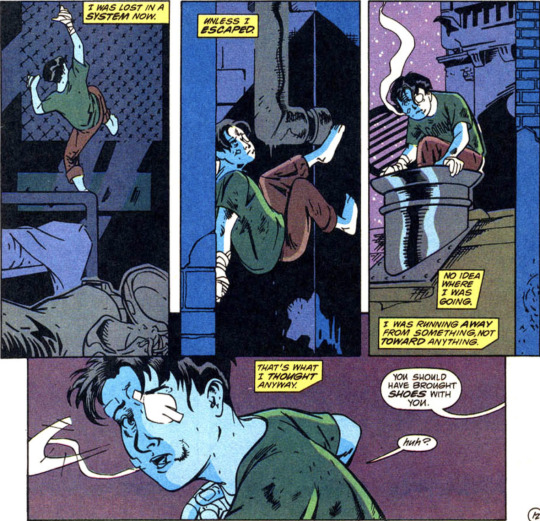
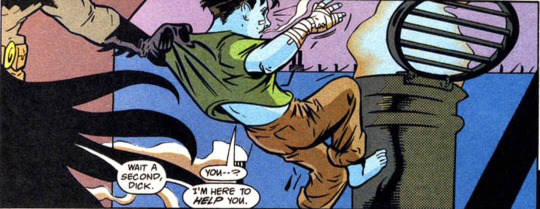
So now, taking in Dick isn’t Bruce tearing Dick away from the chance of having a loving family and throwing him into the dangerous life of a crime fighter; taking Dick in is Bruce saving Dick from a horrible situation, possibly even saving his life. The only way to get Dick out of the potentially deadly situation he was in quickly was for Bruce to take him in as a foster parent. Bruce’s actions actually make a lot of sense! And Bruce is forced by necessity to take on a fatherly role that he does not feel suited or prepared for, rather than him adopting Dick on a whim. The juvie origin gives this scenario the urgency and necessity that it desperately needed.
3.) The juvie origin has been around for a long time, and pretty successfully adds nuance to Dick’s character without completely altering or changing who he is.
The juvie origin is a retcon that has been established for about 25 years, fyi. Robin Annual #4, which is where this idea first came into play, was released in 1995. There are also references to this origin story in Nightwing Vol. 2, and that comic series ran from 1996 to 2009, so it’s not like the juvie origin is completely baseless or totally removed from the narrative.
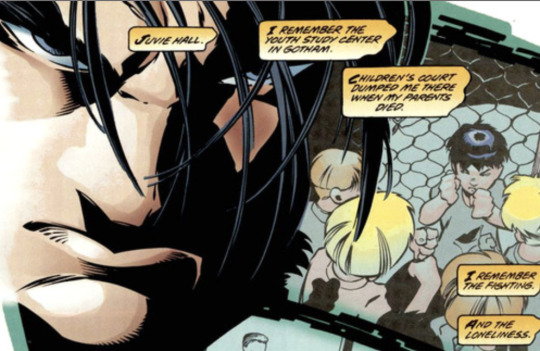
Nightwing (1996) #11
Also...Dick Grayson has been around for 80 years. In DC comics, I’m pretty sure he is predated only by Superman and Batman. You are inevitably going to have to add nuance to his character as time goes on. The juvie origin adds a very interesting complexity to the character and his fight against crime, considering he himself has been in the system...there’s so much untapped potential there!! So yeah, I feel like the juvie retcon is a very valid addition to Dick Grayson’s origin story. Plus, Robin Annual #4 is just a very well written and well thought out comic book that really fleshes out Bruce, Dick, and Alfred’s initial relationships to one another in a realistic way, and more people should check it out.
What I’m saying...is that more people need to get on board and accept the juvie origin guys!! It’s my favorite origin for Dick, hands down. Thanks for giving me an excuse to talk about it anon.
As for where to go for more info…well, you can always check out Dick’s DC wiki, or anyone else’s, for basic summary info. For me, I always like going straight to the source. You could find a comic rec list that focuses on what you’re interested in and just dive in and build your knowledge that way. Sometimes if you google around, you can find neat creator interviews that address questions like the ones you asked. If nothing else, I’m sure there are people on tumblr (like me :D) or elsewhere online who are willing to help you out and point you in the right direction if you’re curious about something in particular. Idk if other people know of a good resource for things like this?
#thanks for the ask anon!#ask#dick grayson#robin#bruce wayne#batman#alfred pennyworth#juvie hall#meta#romani#romani dick grayson
684 notes
·
View notes
Note
You know with how often people bring up Sansa going to Cersei as some ultimate betrayal of the Starks, you’d think they’d remember that Ned went to Cersei too. And it wouldn’t matter if Sansa told Cersei they were leaving because she wouldn’t have known anything about Ned discovering the incest without him literally telling her what he knew and giving her time to hatch her own plan. It’s Ned’s mercy that dooms him and it’s much more narratively satisfying than it would be if it was all Sansa’s fault than if Ned has literally no influence over his own story. Ned also puts his own men into the city watch, leaving his personal guard very small. Ned has much more influence than his 11 year old daughter.
Oh, and when Ned first tells Sansa and Arya that they’ll leaving KL, Sansa says this, “I’ll be good, you’ll see, just let me stay and I promise to be as fine and noble and courteous as the queen.” Ned literally knows that Sansa idolizes the queen and says literally not one word to her about Cersei not being trustworthy. Sansa is an 11 year old girl who’s upset about leaving a place she liked with tons of things she’d always dreamed of, so she goes to someone she thinks will let her stay. Ned never once warns her against Cersei the way her warns Arya even though he knows that she thinks the queen is perfect.
Once she had loved Prince Joffrey with all her heart, and admired and trusted his mother, the queen. They had repaid that love and trust with her father's head.
Sansa didn’t go to Cersei out of some devious need to betray her father or to see him hurt. It was an act of rebellion - an 11-year-old child seeking the help of a trusted authority figure because she doesn’t understand what her father is doing - because as it’s been pointed out, Ned failed to properly communicate with Sansa just truly how dangerous their situation was. I’ve seen people argue that he did when he told Sansa that he wanted her and Arya back for their safety- but looking back at the chapter (Sansa III) he says nothing to Sansa about his mistrust of Cersei Lannister, thus the explanation he gives is in fact INSUFFICIENT. And I’m sure someone will counter this by saying “well, he was her parent. She should have just obeyed, explanation or no.” And I’m sorry, but I don’t agree, and it’s because of this -
Sansa must wed Joffrey, that is clear now, we must give them no grounds to suspect our devotion.
Sansa had every right to a proper explanation given that her father betrothed her to Joffrey with the intention of using it as a cover to investigate the Lannisters for murder. If Arya who wasn’t in the position that Sansa was as the betrothed to the future king deserved honesty, then so did Sansa. Also, because as it’s been raised before as to why Sansa continued to trust Cersei after the Trident- it’s been pointed out before that despite everything that happened, nothing happened to Sansa and Joff’s betrothal. From Sansa’s perspective, she was still excepted to marry into this family. Consequentially, it is no wonder she ended up romanticising the Lannisters again, rather than face the horrible truth about who they really are. It’s why she insists Joff is nothing like his father, that “old drunken king” even though there are several parallels between Joffrey’s behaviour at the Trident and Robert’s at the tourney feast. Such actions don’t paint her as stupid. They reveal her as human - after all, how many of us have lied to ourselves? Sansa isn’t alone in this. Ned lies to himself about Robert- taking a while to truly accept that his friend has changed. Tyrion lies to himself about Shae. Both were also much older than Sansa, who was a child.
Furthermore, if Sansa going to Cersei was truly so instrumental in Ned dying then you would think the show’s decision to cut it out would have some sort of effect. Except it doesn’t really. Ned still goes to Cersei (who is already planning her own shit) Littlefinger still betrays Ned, Janos Slynt also betrays Ned, Ned still sends much of his guard away causing him to be more vulnerable. It’s almost like Sansa going to Cersei had little to no impact at all, other than her becoming captive and Arya going on the run. If you want to blame her for the death of the Stark household then fine as it was just meant to be them and the girls going home, but again I can go back to Ned and ask why the hell didn’t he appoint guards for his daughters, given how dangerous he thought KL was, to prevent such a situation. Because if your daughter is telling you how much she admires the queen (the woman you distrust) then that may be a clue you need to keep an eye on her. Also regarding Ned- he was actually planning on staying in Kingslanding. He wanted the girls back in WF, but he said nothing about himself. So hypothetically let's just say the girls did get sent away, certain factors will still exist. Robert will still die, Littlefinger will see betray him, Renly a possible ally, will still be gone. Joffrey will still go mad at Ned declaring him a bastard, and Cersei will still arrest him for treason. In the books, Ned falsely confesses to treason in order to protect Sansa (paralleling his decision to lying about Jons parentage in order to protect him) However even without Sansa’s life being in jeopardy, the outcome IMO would still have been the same. One, Varys obviously has his own agenda and I could very easily see him persuade Ned to confess in order to prevent his son Robb from going to war-
"Robb is only a boy," Ned said, aghast.
If Ned falsely confesses to treason in order to protect Sansa who is “no more than a child”, then it is very easy to see him do the same for Robb to protect him from having to go to war, that he saw only as “a boy”. I always found that interesting he would say that, given that this is the same man who tells his wife their three year old son “won’t be three forever”. And yet here faced with the prospect of his other son going to war, Ned is horrified. It’s probably all coming back to him - how he also went to war for the first time when he was not much older than Robb. Neds chapters showcase the trauma that he suffered because of it, which furthers my belief that he would try to prevent Robb from experiencing that. Thus Ned still “confesses”, and he still dies. Because nothing has been done to remove the fact that Joffrey is wildly unpredictable that doesn’t listen to his counsellors (theres a reason why Tommen is regarded as more controllable) or the fact that it has been strongly implied that LF might have had some influence on Joffrey suddenly changing script-
His queen mother stood beside him in a black mourning gown slashed with crimson, a veil of black diamonds in her hair. Arya recognized the Hound, wearing a snowy white cloak over his dark grey armor, with four of the Kingsguard around him. She saw Varys the eunuch gliding among the lords in soft slippers and a patterned damask robe, and she thought the short man with the silvery cape and pointed beard might be the one who had once fought a duel for Mother.
The High Septon clutched at the king's cape, and Varys came rushing over waving his arms, and even the queen was saying something to him, but Joffrey shook his head.
You know whose behaviour isn’t described here? Littlefinger’s. There is no description of LF acting shocked or panicked. That’s very telling.
tldr: sansa is not to blame for her father’s death. it was various other factors that ultimately ended up dooming him. sansa went to cersei not because she wanted to “betray” her father, but because she trusted cersei. it was a horrible situation in which a child’s trust was taken advantage of in the most wretched way, and its time the fandom stop blaming sansa for it.
#sansa stark#sansa stark defense squad#sansa#asoiaf#a song of ice and fire#game of thrones#got#asks#lmafo didnt mean for this to get so long
211 notes
·
View notes